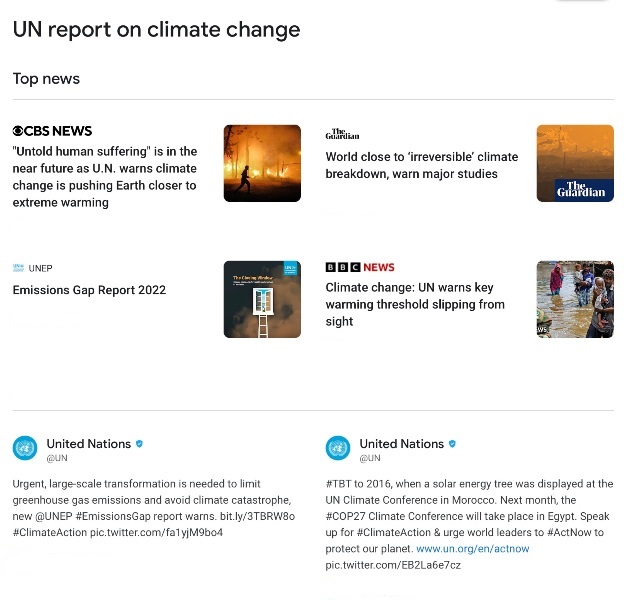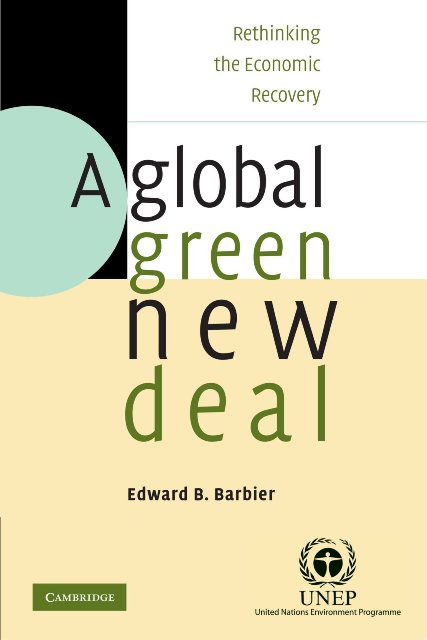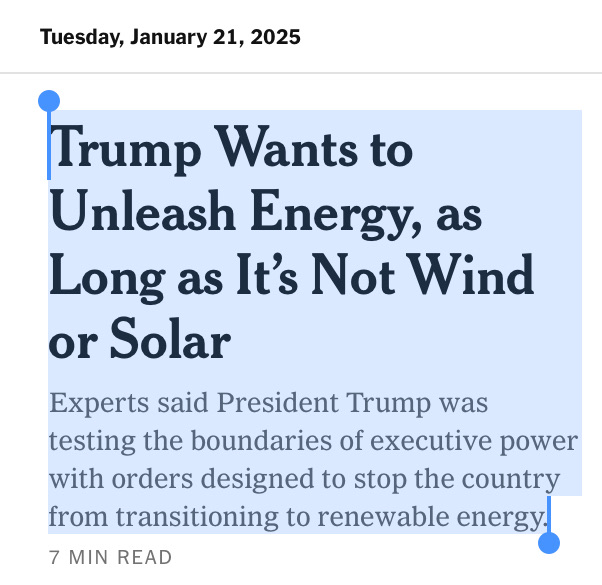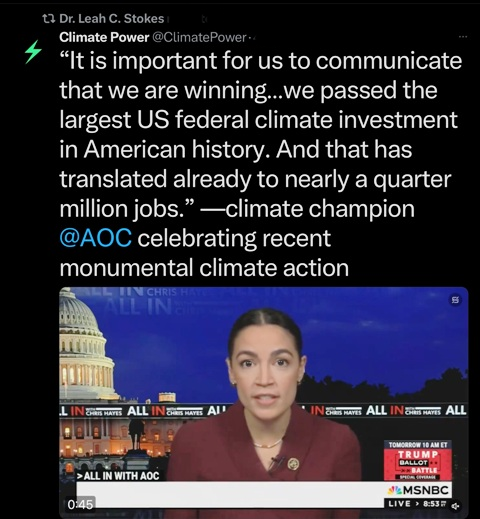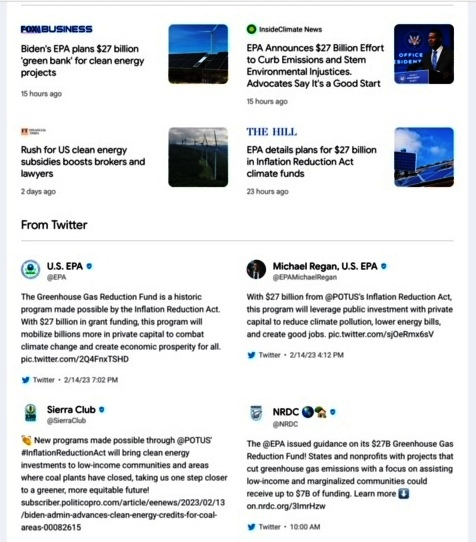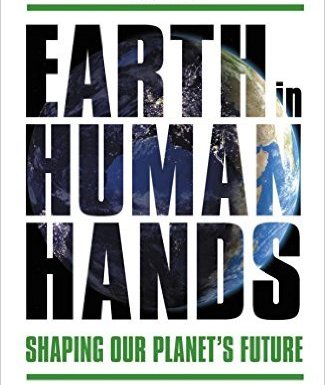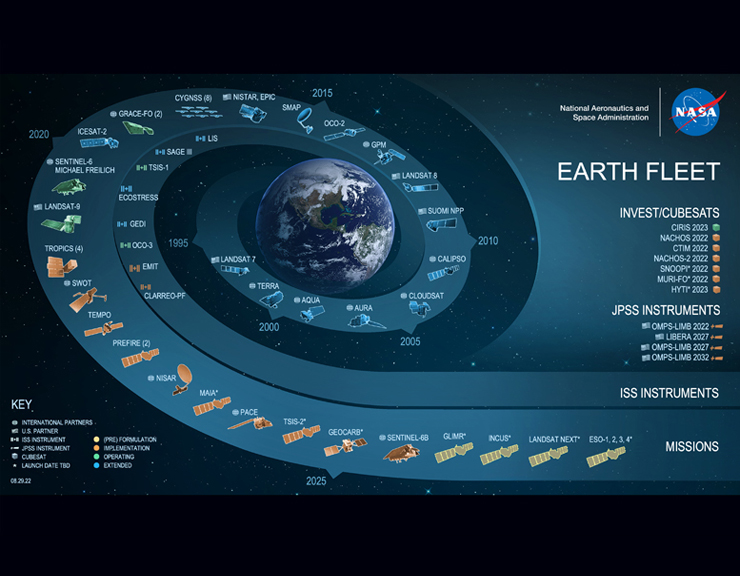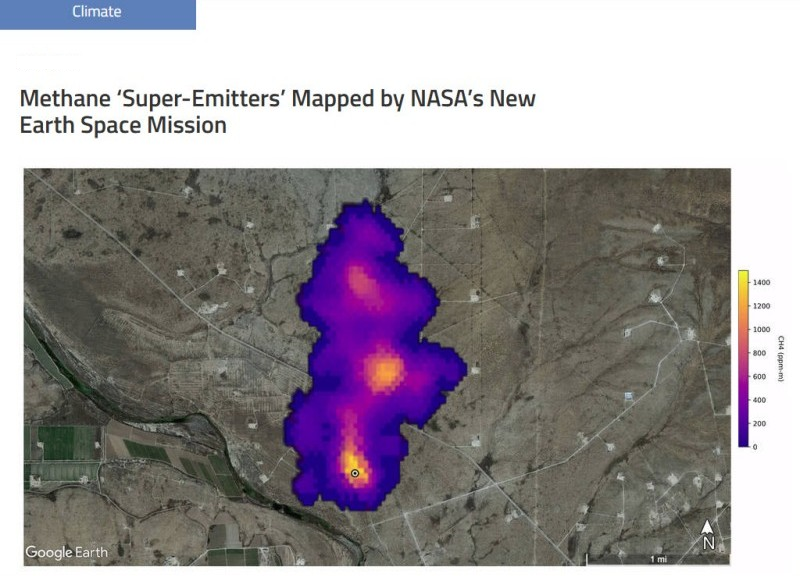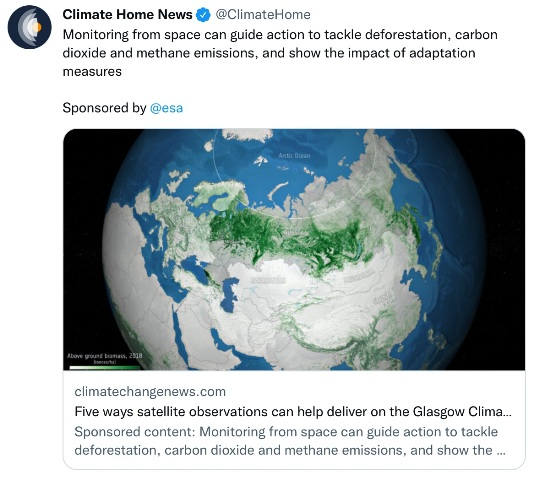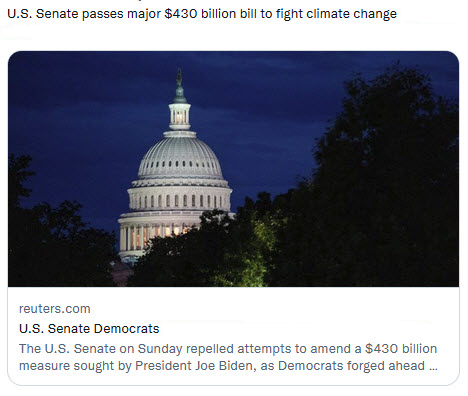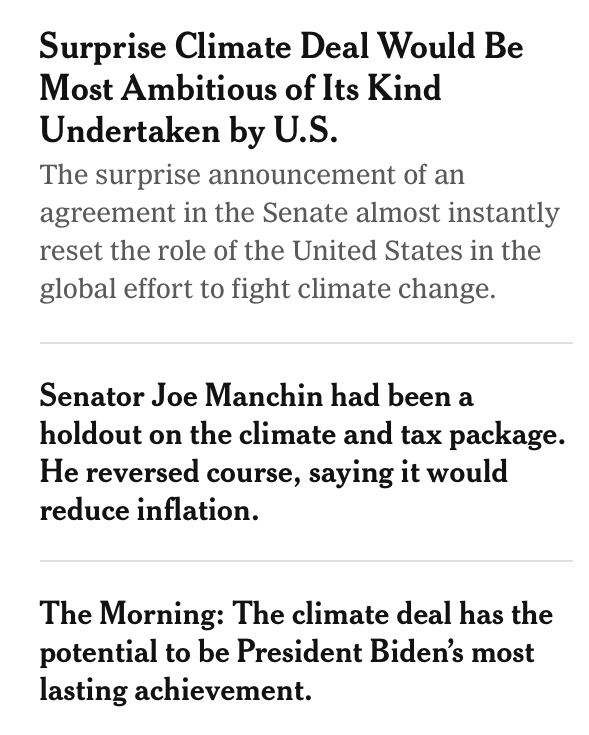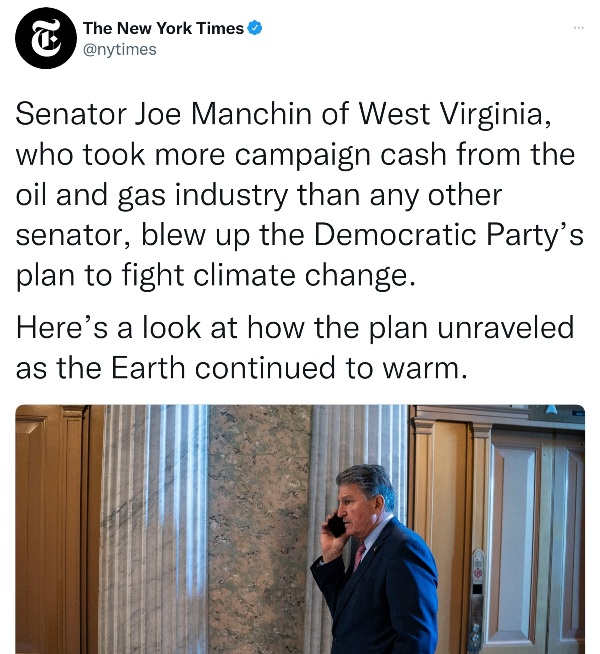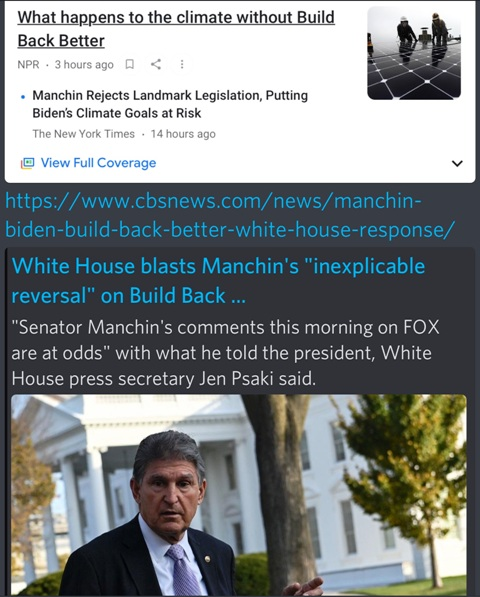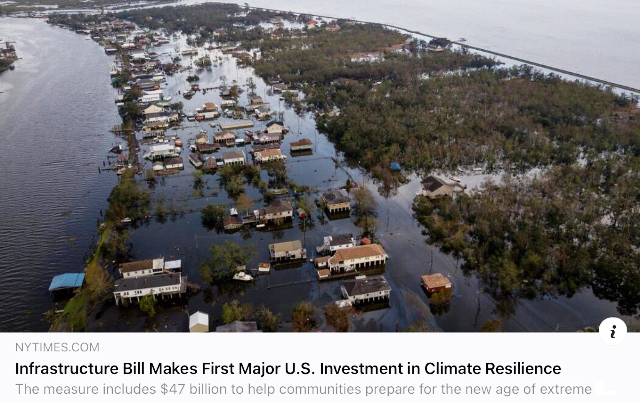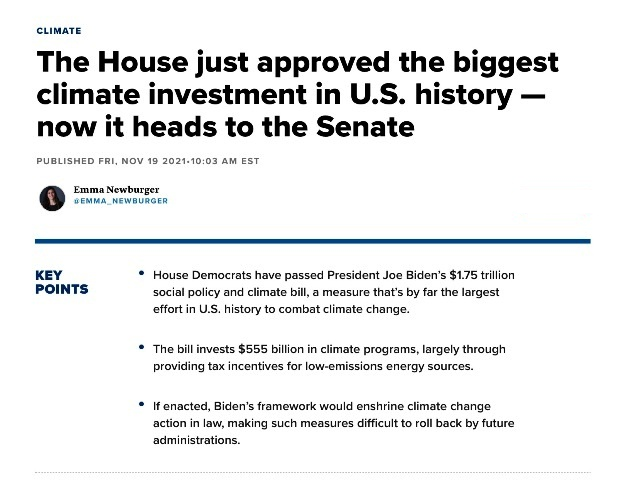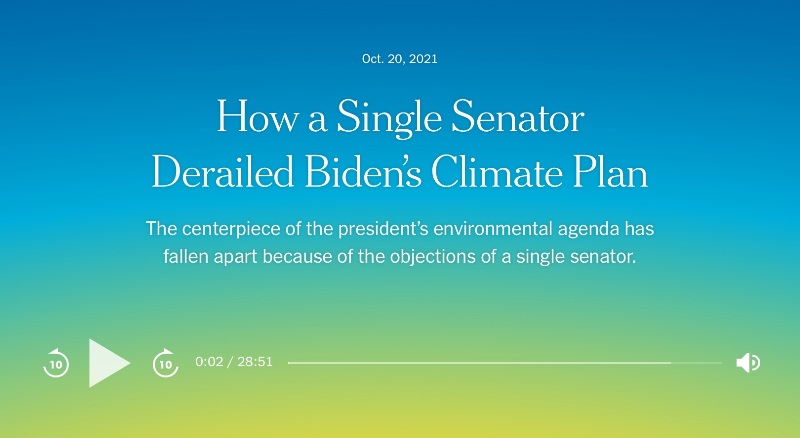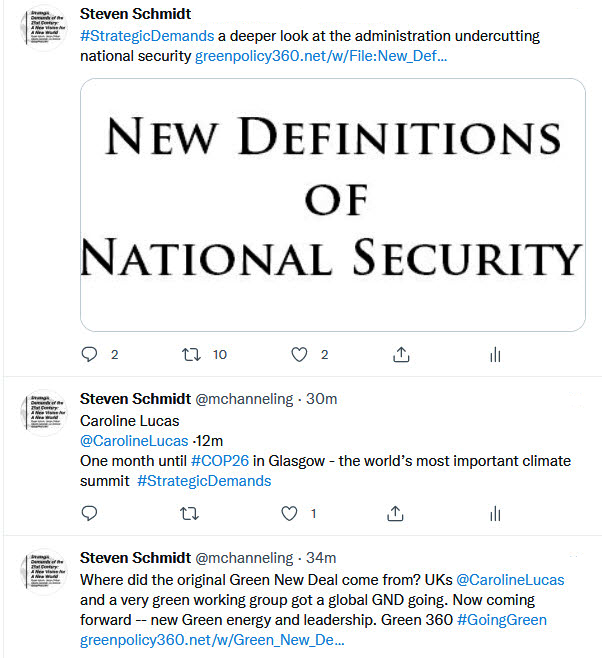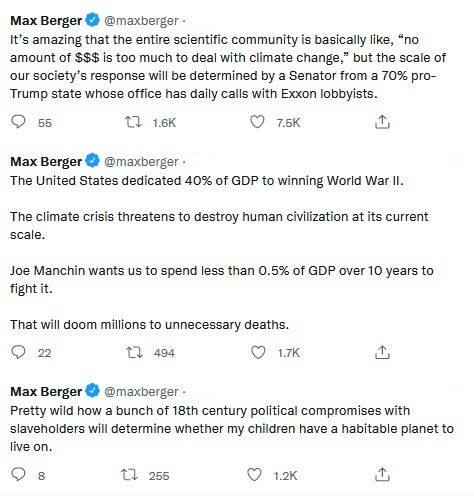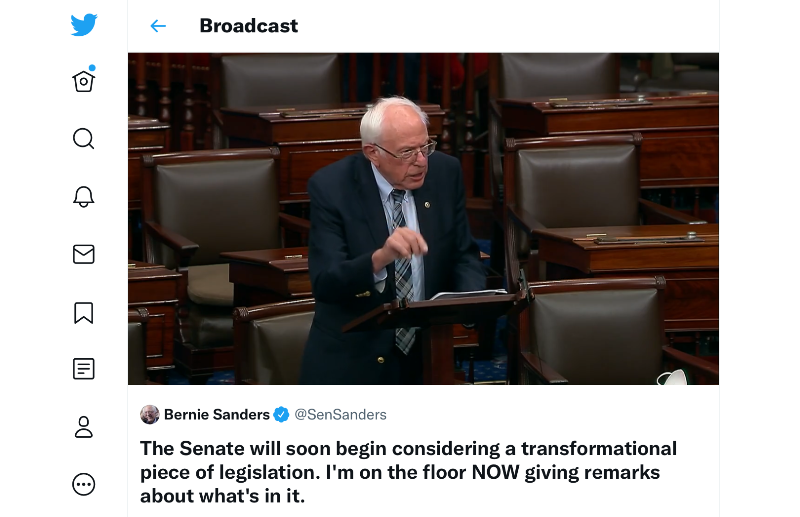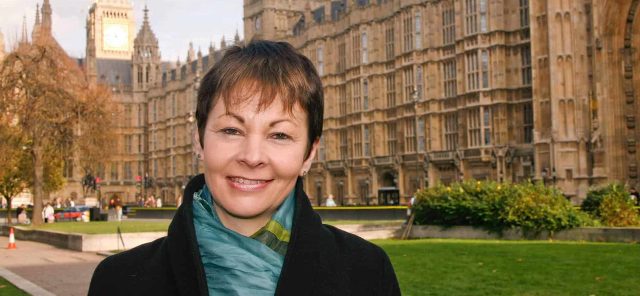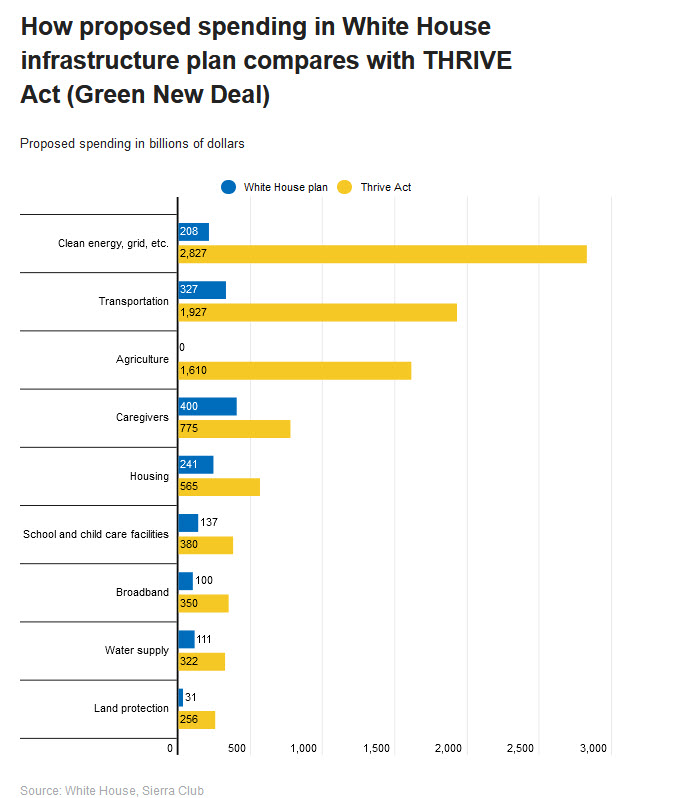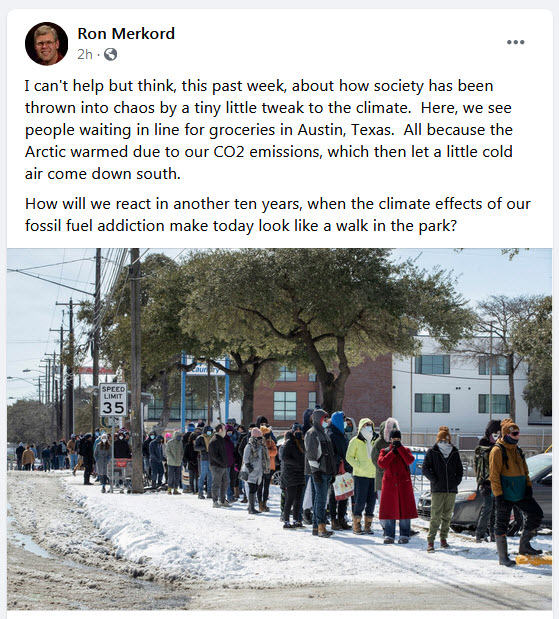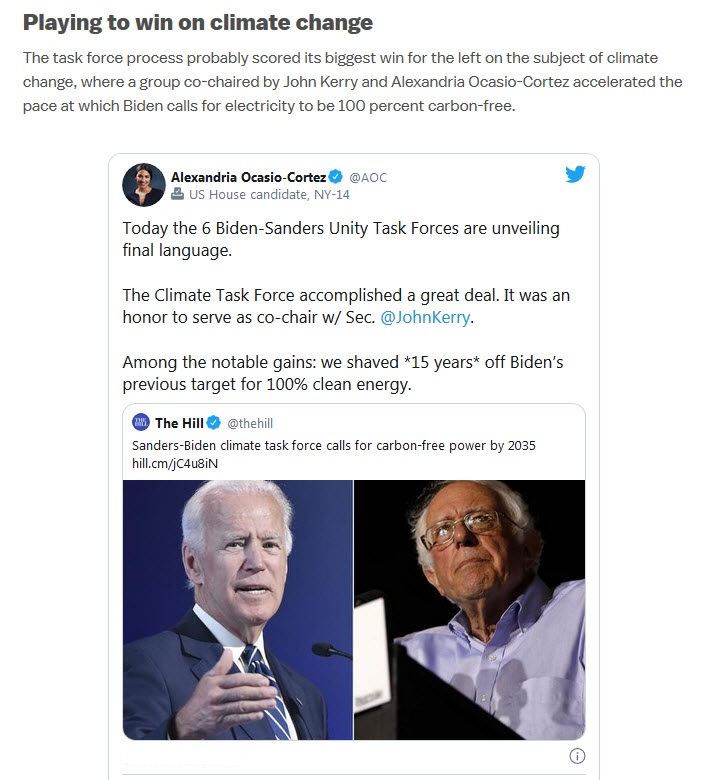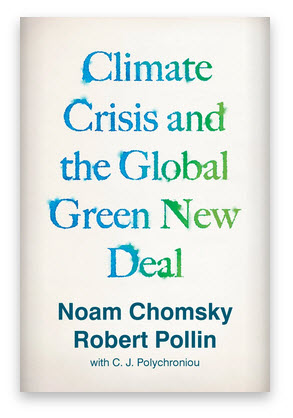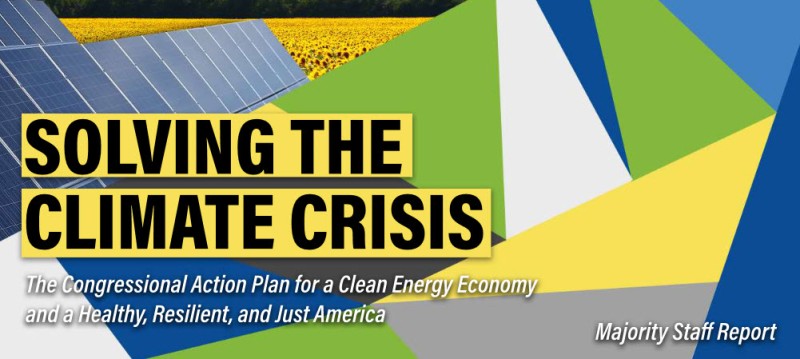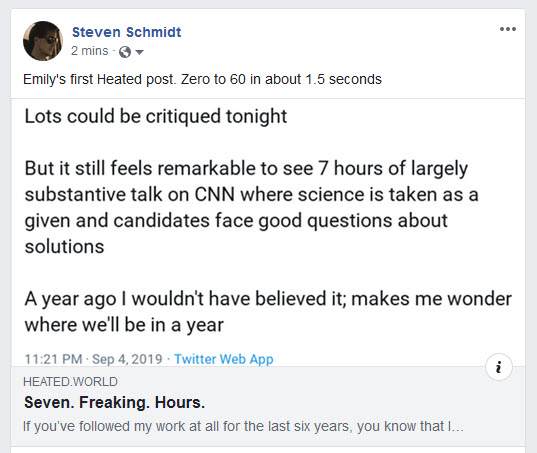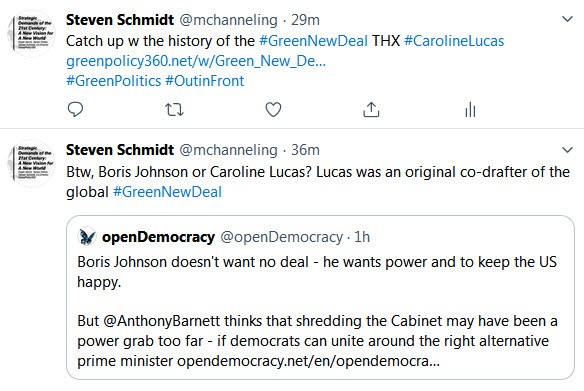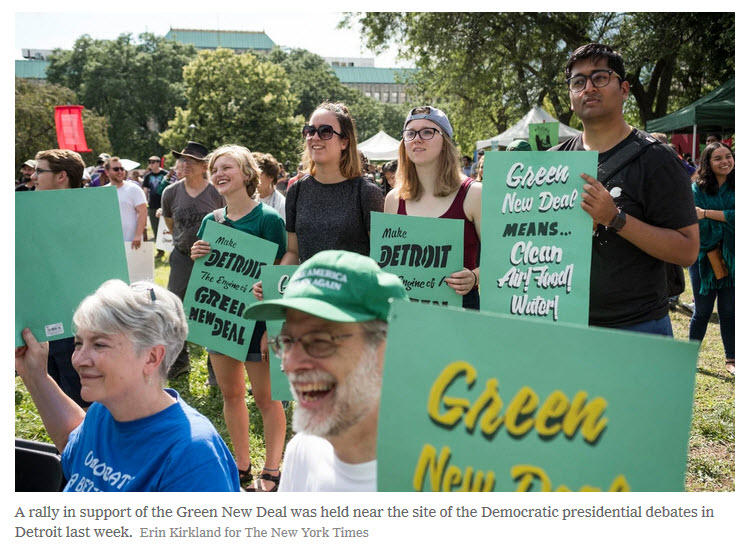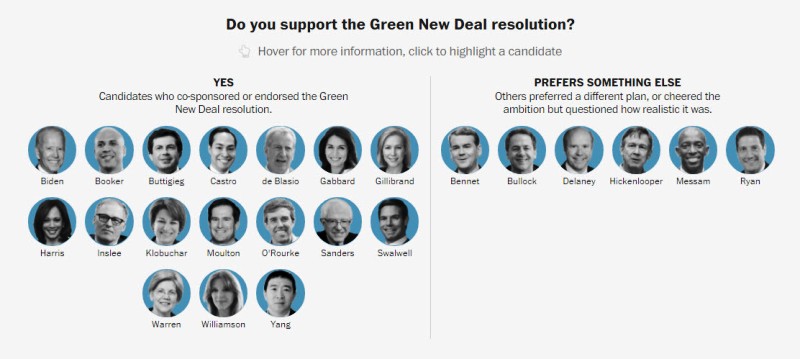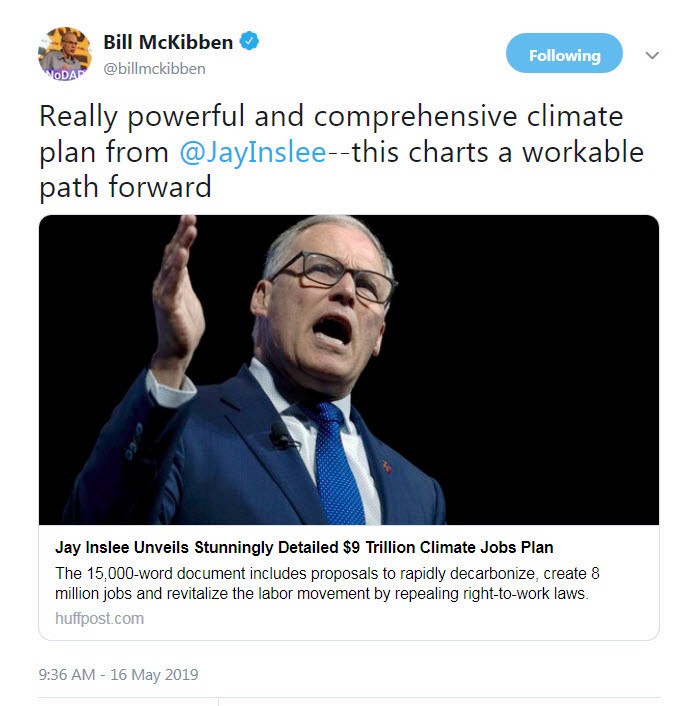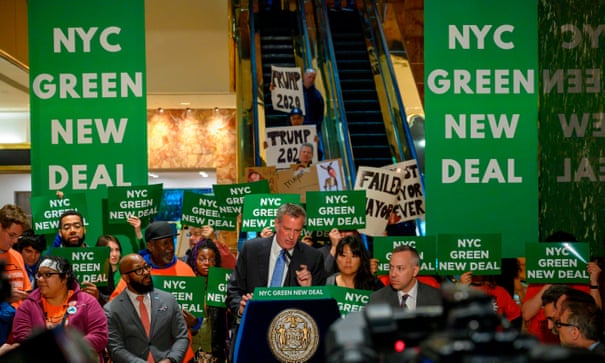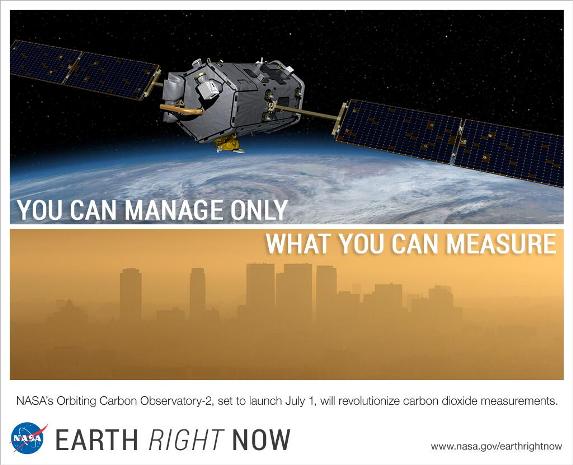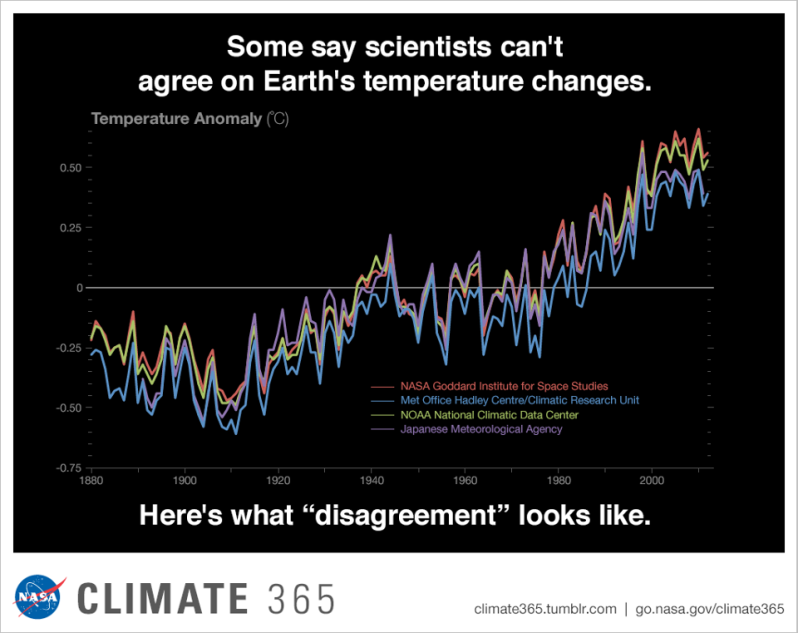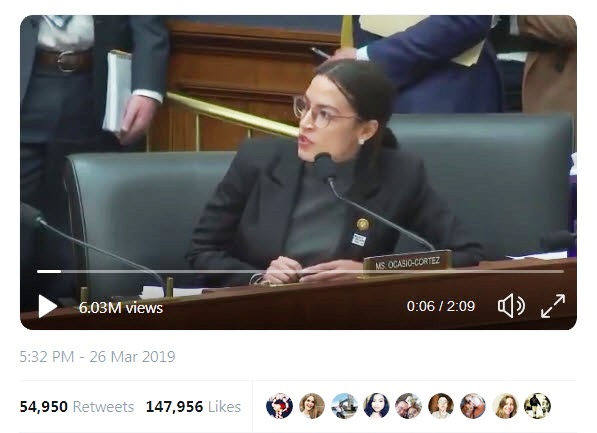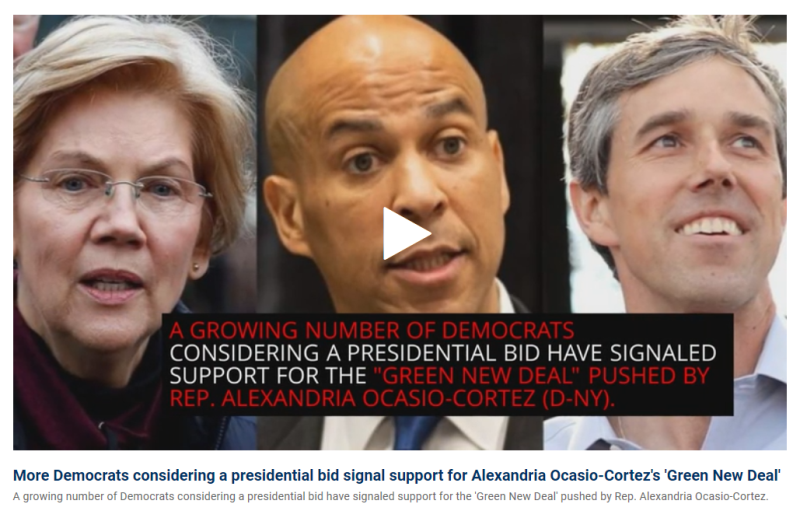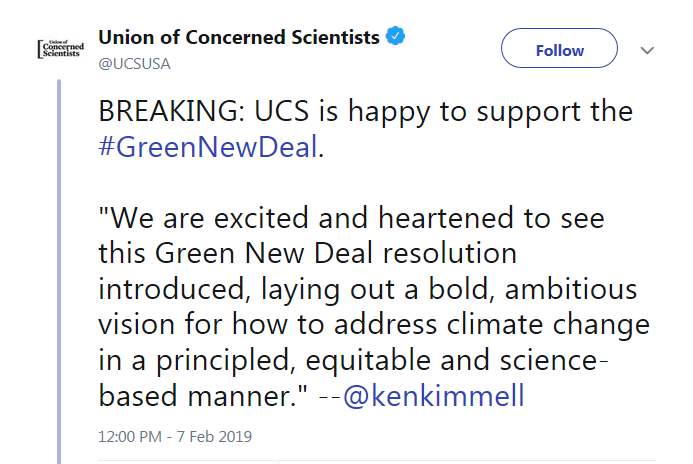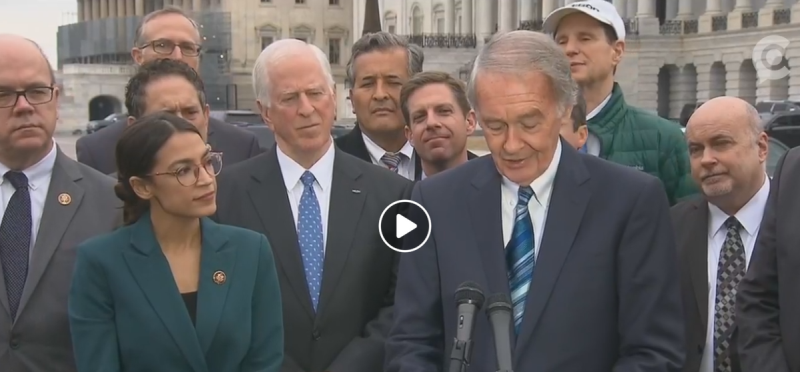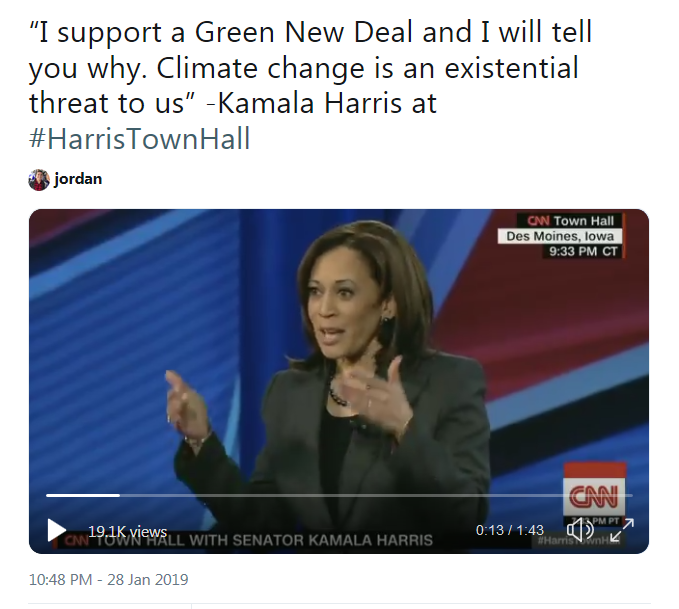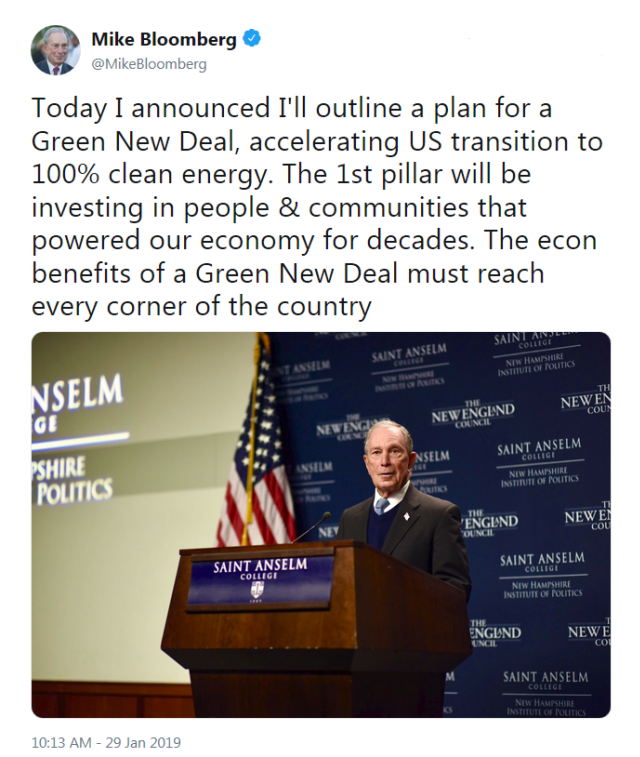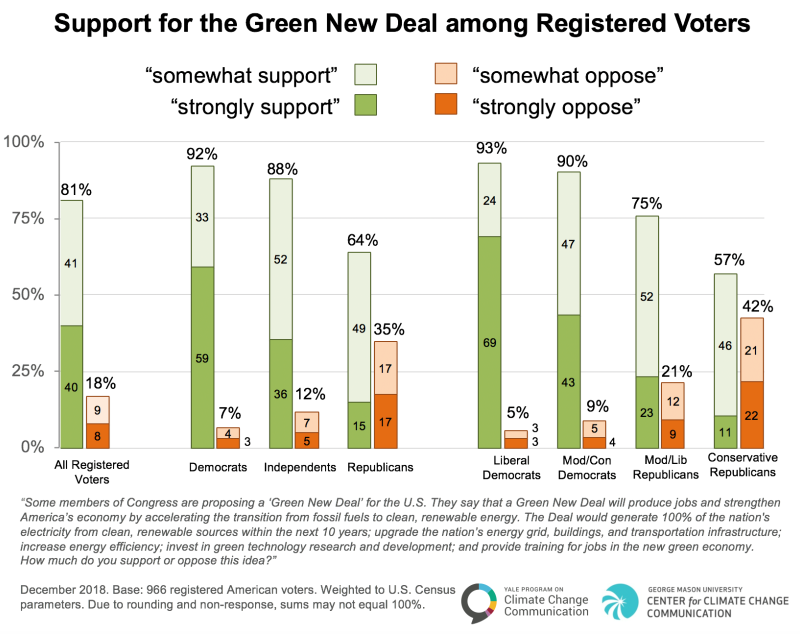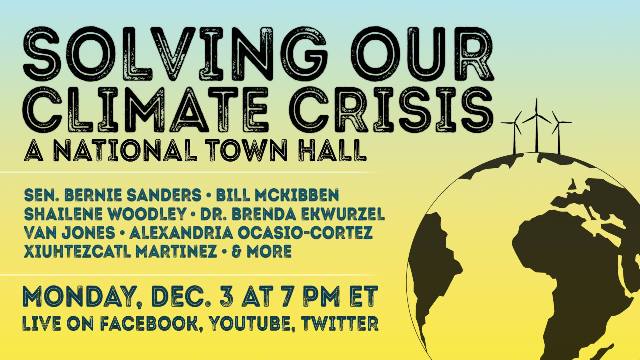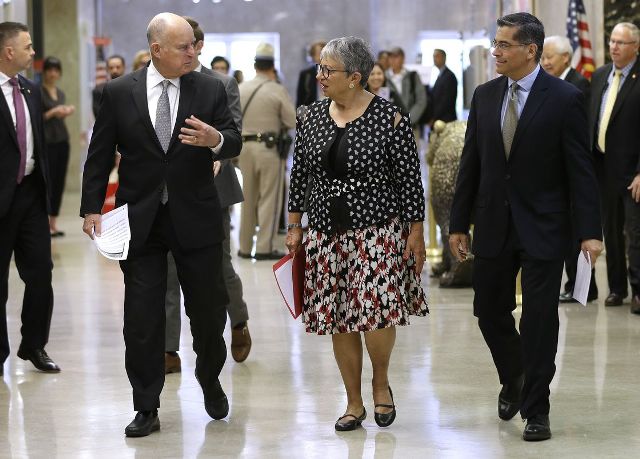Green New Deal
On the Climate Change front, what the world is dealing with ...
- What is being proposed across the world includes ...
In the U.S., during the Biden administration - Biggest climate related legislation in history ...
2025
In the U.S., during the Trump administration ...
Follow GreenPolicy360's Climate News | Green Stories of the Day | Earth and Space, Politics ... climate/energy/science and developments ... Trump-related action, legislation, climate-related rollbacks and setbacks.
Washington, D.C., February 6, 2025 - In the first two weeks of President Donald Trump’s second term, the administration has begun to scrub critical environmental resources and datasets from federal agency websites. To combat this effort to suppress and censor public data, the National Security Archive’s Climate Change Transparency Project today publishes a selection of materials on climate change and environmental justice that have been deleted from agency web pages and spotlights the environmental and archivist organizations working to identify, scrape, and preserve these critical data.
During President Trump’s first term, organizations like the Environmental Data and Governance Initiative (EDGI) documented the administration’s widespread campaign to suppress climate and environmental data, like when it deleted all webpages, fact sheets, and emissions and financial incentives calculators related to President Obama’s 2015 Clean Power Plan. Since the 2024 presidential election, EDGI and environmental advocacy organizations alike have anticipated the targeting of federal environmental and climate data and have been archiving datasets and preparing to rebuild public access to web tools.
So far, one of the most glaring deletions from the current administration has been the removal of the White House pages on the Council of Environmental Quality (CEQ) and the Office of Science and Technology Policy (OSTP), divisions within the Executive Office of the President that coordinate federal environmental and scientific efforts and work closely with federal agencies and other White House offices on environmental energy policies and initiatives.
Read more:
Disappearing data in the Trump administration
Enviro-Rollbacks, beginning with Executive orders and scrubbing/deleting of environmental/science/health protection data ...
Trump Era Enviro-Rollbacks (2016-20)
- https://www.brookings.edu/interactives/tracking-deregulation-in-the-trump-era/ | Brookings - Deregulatory Tracker
- https://www.brookings.edu/blog/up-front/2020/12/15/the-trump-administrations-major-environmental-deregulations/ | Brookings on Trump's Environmental Dereg. Record
- https://www.greenpolicy360.net/w/File:Climate_Change_Litigation_Databases_Climate_Law.png | Climate Litigation Database
- http://columbiaclimatelaw.com/resources/climate-deregulation-tracker | Climate Deregulation Tracker
- http://blogs.law.columbia.edu/climatechange/ | Columbia Law School - Climate Change Blog
- https://climate.law.columbia.edu/content/energy-law | Columbia Law - Energy Law
- https://climate.law.columbia.edu/content/environmental-land-use-law | Columbia Law - Environmental, Land Use Law
- http://columbiaclimatelaw.com/resources/silencing-science-tracker/ | Columbia Law - 'Silencing Science' Tracker
- https://eelp.law.harvard.edu/2018/07/tracking-the-trackers/ | Harvard Law - List of Organizations Tracking US Environmental 2016-2020 Rollbacks
- https://www.nytimes.com/interactive/2020/climate/trump-environment-rollbacks-list.html | NYT - Trump Envir Rollbacks
🌎
2024
October 30, 2024
Clean Energy Is Booming in the U.S. The Election Could Change That
Over the last two years, a surge in clean energy manufacturing has helped push U.S. factory construction to the highest level in half a century. Solar power installations and electric car sales are breaking records. Even Republican-led states like Montana and Utah are writing climate plans to secure federal cash.
Yet the law driving this dizzying transformation of America’s energy landscape, the 2022 Inflation Reduction Act, is facing a highly uncertain future as next week’s election looms.
If he returns to the White House, former President Donald J. Trump has suggested he would gut the law, which is expected to pour as much as $1.2 trillion over the next decade into technologies to fight climate change such as wind turbines, solar panels, nuclear reactors, carbon capture and E.V.s, as well as the factories to supply them.
“My plan will terminate the Green New Deal, which I call the Green New Scam,” Mr. Trump said in September, using his catchall phrase for climate policies. “We will rescind all unspent funds under the misnamed Inflation Reduction Act.”
Read the Election 2024 article
More GreenPolicy360 Climate News
Climate Action Plans 360
- Environmental Laws & Environmental Movement
- Climate Change
- Climate Policy
- Climate Change Terms
- Too Hot
- Hotter 'n Hotter
- Climate Problems, Climate Solutions
- Measure to Manage
- INDC Pledges & Promises
- National Climate Plans
🌎
- "Largest US federal climate investment in American history..."
2023
In Biden’s Climate Law, a Boon for Green Energy...
NY Times / Nov. 23
The law has effectively created a new marketplace that helps smaller companies gain access to funding, with banks taking a cut.
The law, signed by President Biden, effectively created a financial trading marketplace that helps smaller companies gain access to funding, with Wall Street taking a cut. Analysts said it could soon facilitate as much as $80 billion a year in transactions that drive investments in technologies meant to reduce fossil fuel emissions and fight climate change.
The law created a wide range of tax incentives to encourage companies to produce and install solar, wind and other low-emission energy technologies. But the Democrats who drafted it knew those incentives, including tax credits, wouldn’t help companies that were too small — or not profitable enough — to owe enough in taxes to benefit.
So lawmakers have invented a workaround that has rarely been employed in federal tax policy: They have allowed the companies making clean-energy investments to sell their tax credits to companies that do have a big tax liability...
○
'Green Bank', US Acts with $27 Billion
States and nonprofit groups can apply for $27 billion in funding from a “green bank” that will provide low-cost financing for projects intended to cut planet-warming greenhouse gas emissions.
The bank/Greenhouse Gas Reduction Fund, created by Congress in the landmark climate law approved last year, will invest in clean energy projects nationwide, with a focus on low-income and disadvantaged communities.
2022
As the nations of the world send their delegations to the 27th global conference on climate change, COP27, Conference of the Parties gathering in Egypt, and activists/citizens and planet citizens/NGOs and non-profit organizations/public interest groups/educational institutions/media and academics attempt to make real climate-related progress, we at GreenPolicy360 renew our Initiative to 'Turn National Climate Plan Promises & Pledges into Reality'.
GreenPolicy360 focuses on using the tools of science and the law, the sharing of 'green best practices' using databases and online networking, to accelerate a full-range of problem identification and effective solutions.
The broader GreenPolicy360 goal is to work within all political systems, all nations and communities. GreenPolicy360 sees a broad-based approach to problem solving employing the latest technologies and deep funding/financing to empower public and private climate-related and clean energy solutions. We believe a multi-nation, multi-thread approach, adaptable nationally, politically, culturally, locally, will act in effect as a Global Green New Deal, providing critically needed tools to work the climate crisis.
Earth is in our hands
Planet Citizens, Planet Scientists
Climate Problems, Climate Solutions
🌎
GreenPolicy360's Campaign to 'Turn National Climate Promises & Pledges into Reality'
- Our 2021 Climate Plans Enforcement Initiative continues as the 2022 Global Climate Conference approaches, November's Conference of the Parties (COP27)
- Drawing from the database of Earth Science resulting from decades of space-based missions designed to provide us with actionable 'Earth-system and Climate-related data'
- Measuring and Monitoring to better manage Earth's Living, Dynamic and Changing Systems, Local, National and Global
Methods to Enforce Climate Plan Pledges
GreenPolicy360: Climate Plans Enforcement Initiative
Pressuring Nations to Step Up, Cooperate, and Act Now
Environmental Laws, Regs, Rules... Lawsuits & Legal Actions
Glasgow (2021) & Paris (2015) Summits: Int'l Climate Plan Pledges & Promises (INDCs-NDCs)
"Earth Observing System": From the 1960s on... Decades of Earth Science/Climate Science Data Accessible for Planet Citizen Action
🌎
Methane hot spots we're coming to find you, identify you, act to stop you and enforce climate laws
"Super emitters", we have a message for you, you can't hide....
* https://www.nasa.gov/feature/jpl/methane-super-emitters-mapped-by-nasa-s-new-earth-space-mission
🌎
October 2022
Another Year of GreenPolicy360's 'CLIMPE' plan-in-progress (Climate Plan Enforcement)
'Turning promises & pledges into reality', a toolkit for Planet Citizens.
- Now is the time for Planet Citizen climate action.
GreenPolicy360: Climate Plans Enforcement
Green Best Practices, Nation-by-Nation
- (launched in March 2021)
🌎
Preparing for the Next Global Climate Conference
Last year's Glasgow Climate Pact urged countries to increase their ambition. Few have...
Via Grist / World Resources Institute
United Nations: Meeting global climate goals now requires ‘rapid transformation of societies’
Via Carbon Brief
Climate Pledges Are Falling Short, and a Chaotic Future Looks More Like Reality
Via NY Times
🌎
GreenPolicy360: Initiatives to "Turn National Climate Action Promises & Pledges into Reality"
- As the Next Global Climate Conference Approaches, November's Conference of the Parties (COP27), GreenPolicy360 Initiatives Push Forward
Methods to Enforce Climate Plan Pledges
GreenPolicy360: Climate Plans Enforcement Initiative
Pressuring Nations to Step Up, Cooperate, and Act Now
Environmental Laws, Regs, Rules... Lawsuits & Legal Actions
Glasgow (2021) & Paris (2015) Summits: Int'l Climate Plan Pledges & Promises (INDCs-NDCs)
🌎
History of the Green New Deal on Open Access Wikipedia
··································
October 27, 2022
GreenPolicy360: A Green New Deal 'by another name' and a Global Green New Deal Needed Now More than Ever
- The Green New Deal and Global Green New Deal morph into Numerable Versions of Green Deal Legislation
- (Where's the Money to Move Nations of the World Away from Climate Crisis and Disaster?)
SJS / GreenPolicy360 Siterunner: As we have previously explained at GreenPolicy, the US Green New Deal, an 'all hands of deck' approach imported from the UK Global Green New Deal (see chronology below), continues to morph into a broad menu of climate change actions and clean energy investments. The incentives passed in US Congress in the US under a new legislative package named the "Inflation Reduction Act (IRA)" promises hundreds of billions in spending and more as investments motivate the private sector to speed and scale up climate action.
Now in the last week of October as we approach the UNFCC conference in Egypt, COP 27, the next global climate summit following the COP 26 in Glasgow last year, we should take a quick look at the current progress and lack of progress being made toward climate solutions, money-at-work -- loans, contributions, investments, nations, managed funds, private contributions/giving, incentives/insurance/risk management, pricing (carbon pricing). What solutions are making a real-world difference, a positive difference as the nations of the world face the great challenge of our generation -- the climate change crisis.
Again, it is time to turn toward the money and the old worn line "follow the money" once again into focus as we/GreenPolicy360 pursue what we've described as 'how can we best turn national climate promises and pledges into reality'...
Climate Plans Enforcement - Resources
Glasgow Climate Summit - Pledges, Promises, Declarations - What's Next Up
Focus on investing, capital, banking, taxes, insurance and reinsurance, risk assessment.... i.e., different forms of capital investment -- money needed to finance rapid build out of climate change related, energy production, efficiency, distribution and all related and effective strategies and tactics, plans and operation to tackle the climate crisis locally, nationally and globally.
Let's start with the US Climate 'Ambassador', John Kerry, on how he's traveling from continent to continent, national to nation, to mobilize climate-related investments.
by Bill McKibben
Especially note the private capital, banking, pension, 'de-risking' approaches to tap into billions/trillions of climate related, clean energy investments…
>In essence, Kerry is consumed by “concessionary finance”—projects in which governments or charities remove much of the risk so that risk-averse private capital will supply the bulk of the investment. Right now, that’s difficult to negotiate. Banks, for instance, have committed to providing loans for clean energy: in Glasgow, the former governor of the Bank of England Mark Carney announced the Glasgow Financial Alliance for Net Zero, or gfanz, which represents an international consortium of banks and asset managers, with a hundred and thirty trillion dollars in assets, that are ready to get to work. Almost half the world’s private financial assets are in the U.S., but the American banks in the alliance were threatening to leave it earlier this fall, because they don’t want to stop lending for fossil-fuel-industry expansion. (The rules are apparently being reinterpreted to accommodate them.) Regardless, Kerry said, “the reality is there’s not a hundred and thirty trillion dollars that’s ready to be deployed.” Banks are “going to invest in a revenue stream, or in a new technology. They can invest in renewables in a place where they can get a Power Purchase Agreement, for example”—an agreement in which a third-party developer guarantees the revenue stream from a new renewable technology—“and where you can get a financial outtake over thirty years.” But, Kerry added, “if you don’t have eleemosynary money, you can’t deploy that bank capital. It will go, instead, to invest in something that will have a steady revenue stream. Particularly if that money comes from pension funds—they have an obligation to pay out that money to people who spent a lifetime working hard. They have to make x amount of dollars. So that’s a restraint against your ability to deploy the funds. It’s just how money works in the marketplace.”
Kerry believes that we “could make some of these deals happen tomorrow, if we could get money on the table to de-risk the deal. We need to be able to have blended finance, so some money can come from charity.” (He was scheduled to attend a meeting with people from Jeff Bezos’s foundation to discuss the idea.) “And we need straight public expenditure. Biden has quadrupled the amount he’s asking for,” Kerry said, referring to the President’s request to Congress to increase international climate aids. “This year, he’s doubled it, to $5.6 billion, and next year he’s trying to double it again, to $11.4 billion.” Eleven billion dollars sounds like a lot, but the potential global damage from climate change this century, by some calculations, tops sixty-nine trillion. To head off some of that damage, the U.N. estimates that the world must spend more than two trillion dollars annually for the next three decades on clean-energy transition. “We’re not going to get that kind of money out of any country,” Kerry said. “The only entity in the world that has the money to transition fast enough to keep us under 1.5 is the private sector.” These are not, in fact, new ideas—Germany has a large fund that does this kind of de-risking work, which helped with a recent deal to get Egypt moving more quickly toward renewables. But the United States has never agreed to such funding, and the current outlook for the midterm elections doesn’t improve the prospects that it will. “That $11.4 billion that Biden is requesting has to be congressionally approved, and that’s not easy,” Kerry said. “So we’re also looking at several other ways right now.” Kerry thinks that the multilateral development banks, under their current rules, could increase their lending “simply by internally reforming the way in which they manage their capital accounts.” He added, “We are the biggest shareholders in the World Bank, and so, together with France, Germany, and so on, we’re going to try and see if we can push this initial reform in the way these banks manage. That’s one track.” (And one that may explain why, without explicitly saying so, the Administration appears interested in replacing the Trump appointee who currently runs the World Bank Group.)
Now let's move to an opinion is from someone who was, as I was, at the Graduate Faculty of the NY New School in the 70s and went on to become a leading political economic adviser in the US (for example in Jerry Brown's 1992 presidential campaign) -- File:Single-Payer-Pollin-Economic-Analysis-CA SB-562.pdf
Here's Robert's bio-- Robert Pollin is distinguished professor of economics and co-director of the Political Economy Research Institute (PERI) at the University of Massachusetts-Amherst. One of the world’s leading progressive economists, Pollin has published scores of books and academic articles on jobs and macroeconomics, labor markets, wages, and poverty, environmental and energy economics. He was selected by Foreign Policy Magazine as one of the “100 Leading Global Thinkers for 2013.” His recent work includes the Climate Crisis and the Global Green New Deal: The Political Economy of Saving the Planet (2020).
Here is what Pollin's commentary is regarding the trillion + issue of financing a Global Green New Deal and what Kerry is attempting to do within the existing framework of int'l politics/political economics
>Pollin: From an historical perspective, the high-income countries, starting with the U.S. but also including Canada, Western Europe, Europe and Australia are almost entirely responsible for loading up the atmosphere with greenhouse gas emissions and causing climate change. They therefore should be primarily responsible for financing the Global Green New Deal. But more recently, as I noted above, China is producing much larger emissions than any other country. China can therefore not be let off the hook as a source of climate financing.
But we also need to recognize that high-income people in all countries and regions have massively larger carbon footprints than everyone else. The average carbon footprint of someone in the richest 10 percent of the global population is 60 times greater than of someone in the poorest 10 percent. From this perspective, the financing of a Global Green New Deal must fall disproportionately on the rich in all countries.
However, more generally, it is not accurate or constructive to consider the issue of financing the energy system transformation as simply a question of who bears how much of the overall burden. We also need to recognize that the overall burden is actually not excessively large and that building a global green economy will also generate huge benefits and opportunities. Consider, for example, just the following:
According to my own research and that of others, a global climate stabilization program capable of achieving the zero emissions goal by 2050 will entail clean energy investment spending of roughly $4.5 trillion per year through 2050. This totals to about $120 trillion over the full period. These are eye-popping numbers from one angle. Yet they amount to an average of only about 2.5 percent of total global income (GDP) between now and 2050. In other words, we can transform the global energy system and save the planet while still spending something like 97 percent of total global income on everything besides clean energy investments. This is also while average incomes are rising over time.
Creating a clean global energy infrastructure will pay for itself over time and save money for all energy consumers. This is because energy efficiency investments, by definition, mean spending less money to get the same amount of energy services — like keeping one’s home well-lit and warm in the winter. Moreover, as I noted above, the costs of delivering a kilowatt of electricity from renewable energy sources is already lower, on average, than getting the same kilowatt from fossil fuels or nuclear power sources, and the costs of renewable energy are falling.
Building the clean energy infrastructure will be more decentralized than the current highly capital-intensive and big corporate dominated fossil fuel infrastructure. Solar energy systems can be installed on rooftops and parking lots and in one’s neighborhood. Wind turbines can be located on farmland without sacrificing productivity in crop or livestock cultivation. This, in turn, will create opportunities to expand access to energy into low-income communities throughout the world, including in the rural regions of low-income countries. Roughly half the people living in these regions do not currently have access to electricity at all.
Overall then, building the global clean energy economy should be understood as a great opportunity for investors and consumers, including especially small-scale investors such as both public and private cooperative enterprises.
That said, it will of course still be necessary to deliver the up-front money to pay for the initial investments. There is no shortage of big pots money that can be tapped in equitable ways...
The global financing project will ... need to be supported by private investors, at a level at least equal to that of government funds. Yet we know that private investors will never deliver sufficient funds without public policies in place that enforce hard limits on profit opportunities through fossil fuel investments, if not eliminating such profit opportunities altogether. The windfall tax on oil company profits proposed in the U.S. Congress by Sen. Sheldon Whitehouse and Rep. Ro Khanna is one good place to start.
The need for such measures has become ever clearer since the fiasco surrounding the pledges made by major private financial institutions coming out of last year’s COP26 climate conference in Glasgow.
Perhaps the biggest single story coming out of the Glasgow conference was the formation of the *Glasgow Financial Alliance for Net Zero (GFANZ), a group of roughly 500 financial sector firms holding $130 trillion in overall assets — i.e., something like one-third of total global private financial assets.
At the conference, GFANZ members committed their institutions to supporting investments that will deliver a zero-emissions global economy by 2050. But now many of the biggest players in the coalition are abandoning their pledges. The explanation is simple, as reported in Bloomberg Green: “The revived fortunes of fossil fuels, especially coal, may explain some of the weakened resolve for decarbonization. Global bank lending to fossil fuel companies is up 15 percent to over $300 billion in the first nine months of this year from the same period in 2021.” Justin Guay, director of climate finance strategy at the Sunrise Project summed up the matter perfectly in commenting: “Banks were happy to sign up to a big pageantry contest at COP26 and get a bunch of applause. But when they realized the world expected them to make good on what they said they would do, they have looked for convenient excuses to wiggle out of that responsibility.”
Let's now look at another famed political economist - Adam Tooze, whose politics place him 'in the middle' unlike Robert Pollin who is seen as 'on the left'.
First, for context, Tooze reviews the larger set of #s, the big players who manage the available private capital ….
Second, Tooze analyzes the Glasgow climate investments and pledges by nations - e.g.
When it comes to climate finance, the gap between what is needed and what is on the table is dizzying. The talk at the conference was all about the annual $100bn (£75bn) that rich countries had promised to poorer nations back in 2009. The rich countries have now apologised for falling short. The new resolution is to make up the difference by 2022 and then negotiate a new framework. It is symbolically important and of some practical help. But, as everyone knows, it falls laughably short of what is necessary. John Kerry, America’s chief negotiator, said so himself in a speech to the CBI. It isn’t billions we need, it is trillions. Somewhere between $2.6tn and $4.6tn every year in funding for low-income countries to mitigate and adapt to the crisis. Those are figures, Kerry went on to say, no government in the world is going to match. Not America. Not China.
We should take the hint. There isn’t going to be a big green Marshall plan. Nor are Europe or Japan going to come up with trillions in government money either. The solution, if there is to be one, is not going to come from rich governments shouldering the global burden on national balance sheets.
So, how does Kerry propose to close the gap? As far as he is concerned, the solution is private business. Hence the excitement about the $130tn that Mark Carney claims to have rallied in the Glasgow Financial Alliance for Net Zero, a coalition of banks, asset managers, pension and insurance funds.
Lending by that group will not be concessional. The trillions, Kerry insisted to his Glasgow audience, will earn a proper rate of return. But how then will they flow to low-income countries? After all, if there was a decent chance of making profit by wiring west Africa for solar power, the trillions would already be at work. For that, Larry Fink of BlackRock, the world’s largest fund manager, has a ready answer.
He can direct trillions towards the energy transition in low-income countries, if the International Monetary Fund and the World Bank are there to “derisk” the lending, by absorbing the first loss on projects in Africa, Latin America and Asia. Even more money will flow if there is a carbon price that gives clean energy a competitive advantage.
It is a neat solution, the same neat neoliberal solution that has been proffered repeatedly since the 1990s. The same solution that has not been delivered.
Talk of carbon pricing evokes the bitter memory of shock therapy in eastern Europe and the developing world. BlackRock’s backstop idea is the logic of the 2008 bank bailouts expanded to the global level – socialise the risks, privatise the profits.
At this point those promising trillions in private funding to fight the climate crisis reveal themselves to be the true utopians, just utopians of a neoliberal variety. Carbon pricing – a fee placed on emissions – may be the economists’ favourite. The one place where it may work, ironically, is in Europe, where energy is already heavily taxed and the most sophisticated welfare states in the world can cushion the impact. China is experimenting with the largest carbon market yet. But as a global proposition, a single minimum carbon price is a non-starter, first and foremost in the US, whose economists invented the idea.
Nor is Congress or any European parliament about to vote in favour of hundreds of billions of dollars to backstop BlackRock. Western states carried out bailouts in 2008 and again in 2020. But those were desperate efforts, faute de mieux, to save the status quo at home. And that was toxic enough. Stretched to a global scale, it has zero political appeal.
However, the risk is not that Cop26 opens the door to some gigantic neoliberal climate stitch-up, but instead that we remain locked in our current impasse, careening towards catastrophe.
Faced with that prospect, both the US and the EU seem less preoccupied with grand schemes of carbon pricing and blended finance, than with pushing a case-by-case approach. Four separate initiatives show the direction of travel.
The deal on aluminum and steel announced by the EU and the US ends one of Trump’s more absurd trade wars and turns it into a process for agreeing on accounting rules for carbon. What seems to be envisioned is a hi-tech, clean-steel trade zone, with tariffs imposed on high-carbon imports from China, Russia and Ukraine. It isn’t a global carbon price, but a sectoral rich-country buyers’ club.
On coal, though the final declaration was disappointing, the US is working with India to promote the rollout of renewables. This involves a three-way partnership with the UAE to provide technical assistance and finance to speed up the move away from coal. India is not the only emerging market with a coal problem.
One of the best pieces of news out of Cop26 was the multinational $8.5bn package to support the winding down of coal burning by Eskom, South Africa’s bankrupt and dysfunctional power utility.
To accelerate the pace of industrial change, history tells us that the key is to incentivise first movers – leading firms that adopt new technologies and thus send the message to their competitors: innovate or be left behind. In unleashing a race to the top, the announcement of the First Movers Coalition in November, backed by the US and the World Economic Forum and involving firms like shipping giant Maersk and Cemex and Holcim, two of the world’s leading cement makers, is potentially a significant step.
Finally, there is the deal to cut emissions of methane, the long-neglected but deadly greenhouse gas, by 30% by 2030. That will involve a technological push across the oil and gas industry worldwide.
Advocates of the Green New Deal have long urged big government-led industrial policy. The approach of Kerry and his team seems to follow a more low-key, pragmatic script. As Danny Cullenward and David Victor write in their book, Making Climate Policy Work, rather than attempting a contentious grand bargain, the key is to find coalitions of the willing and drive change sector by sector, raising ambition through repeated rounds of bargaining.
Like the Paris agreement of 2015, which first demonstrated this pragmatic approach in action, the Kerry initiatives face two big questions. Will a series of ad hoc measures add up to an adequate overall solution? Furthermore, not every deal can be win-win. How will the tough trade-offs be fought out? Whose interests will be served? The reply by the pragmatists is that no general answer can be given in advance. The proof of the pudding is in the eating. It is not much of an answer. But, as Cop26 attests, it may be the only realistic one.
If that is the case, then the response of the climate movement should be to keep up the pressure. In political terms, pragmatic ad hocery may be realistic, but there is no negotiating with the dwindling carbon budget. Given how deeply entrenched the status quo is, the temptation to conservative wishful thinking is everywhere. Someone has to pound the message home. The biggest risk is not to change.
The Tooze full opinion piece is here -- https://www.theguardian.com/commentisfree/2021/nov/16/cop-26-big-business-climate-crisis-neoliberal
Tooze surveys the wants and needs, the demands of a European energy conversion -- realism and net-zero goals with a wild card presented due to the war in Ukraine and disruption of Russian deliveries to Europe of natural gas.
······························································································
August 10, 2022
A Green New Deal by Another Name
- Three Legislative Actions Add Up to a New Version of a Green New Deal
- Infrastructure, CHIPS, IRA...
GreenPoliyc360: Let's look more closely at three huge advances as the US acts to deal with climate...
First up, a multi-billion dollar CHIPS legislation (Creating Helpful Incentives to Produce Semiconductors) just passed in Congress and was signed on August 9th by President Biden, investing tens of billions in tech and research that is, as we will see, extremely significant in the fight against climate change.
Start with the US government's official statement on the passage of the CHIPS and Science Act of 2022 --
Then zoom in on this:
An interagency working group will build on the interagency CHIPS and Science Act planning to date between the Council on Environmental Quality, Environmental Protection Agency, and the Department of Commerce. It will help to ensure collaboration and coordination across federal agencies, the private sector, and with state and local governments to facilitate timely and effective reviews of all federally-funded projects.
The working group will also serve as a clearinghouse for best practices with respect to permitting and other project delivery issues to support implementation of projects funded by the bill.
and consider this:
The CHIPS and Science Act will establish a technology, innovation, and partnerships directorate at the National Science Foundation (NSF) to focus on fields like semiconductors and advanced computing, advanced communications technology, advanced energy technologies...
and add this:
The CHIPS and Science Act authorizes new and expanded investments in STEM education and training from K-12 to community college, undergraduate and graduate education.
Finally, let's look at an astute analysis of the CHIPS Act from Robinson Meyer of The Atlantic:
Over the next five years, the CHIPS Act will direct an estimated $67 billion, or roughly a quarter of its total funding, toward accelerating the growth of zero-carbon industries and conducting climate-relevant research, according to an analysis from RMI, a nonpartisan energy think tank based in Colorado.
That means that the CHIPS Act is one of the largest climate bills ever passed by Congress. It exceeds the total amount of money that the government spent on renewable-energy tax credits from 2005 to 2019, according to estimates from the Congressional Research Service. And it’s more than half the size of the climate spending in President Barack Obama’s 2009 stimulus bill. That’s all the more remarkable because the CHIPS Act was passed by large bipartisan majorities, with 41 Republicans and nearly all Democrats supporting it in the House and the Senate.
Yet CHIPS shouldn’t be viewed alone, Lachlan Carey, an author of the new analysis and an associate at RMI, told me. When viewed with the Inflation Reduction Act, which the House is poised to pass later this week, and last year’s bipartisan infrastructure law, a major shift in congressional climate spending comes into focus. According to the RMI analysis, these three laws are set to more than triple the federal government’s average annual spending on climate and clean energy this decade, compared with the 2010s.
Within a few years, when the funding has fully ramped up, the government will spend roughly $80 billion a year on accelerating the development and deployment of zero-carbon energy and preparing for the impacts of climate change. That exceeds the GDP of about 120 of the 192 countries that have signed the Paris Agreement on Climate Change, Carey says.
By the end of the decade, the federal government will have spent more than $521 billion—nearly half a trillion dollars—to accelerate the development and deployment of zero-carbon energy and to prepare for the impacts of climate change...
The CHIPS Act is not a comprehensive climate bill in the same way that the Inflation Reduction Act, or IRA, is. Unlike the IRA, the CHIPS bill isn’t supposed to drive immediate reductions in carbon pollution or subsidize the replacement of fossil fuels with cleaner alternatives. It probably won’t help the United States get closer to achieving its 2030 target under the Paris Agreement.
Instead, the bill’s programs focus on the bleeding edge of the decarbonization problem, investing money in technology that should lower emissions in the 2030s and beyond. That’s an important role in its own right. The International Energy Association has estimated that almost half of global emissions reductions by 2050 will come from technologies that exist only as prototypes or demonstration projects today.
To get those technologies ready in time, we need to deploy those new ideas as fast as we can, then rapidly get them to commercial scale, Carey said. “What used to take two decades now needs to take six to 10 years.” That’s what the CHIPS Act is supposed to do, at least in theory.
The law, for instance, establishes a new $20 billion Directorate for Technology, which will specialize in pushing new technologies from the prototype stage into the mass market. It is meant to prevent what happened with the solar industry—where America invented a new technology, only to lose out on commercializing it—from happening again, Carey said. Although the directorate will focus on broad improvements across technology, such as AI and high-performance computing, two of the directorate’s 10 new focus areas are climate or clean-energy related. Congress has explicitly tasked the new office with studying “natural and anthropogenic disaster prevention or mitigation” as well as “advanced energy and industrial efficiency technologies”...
The bill also directs about $12 billion in new research, development, and demonstration funding to the Department of Energy, according to RMI’s estimate...
For the past few years, scholars and experts have speculated about whether industrial policy—the intentional use of law to nurture and grow certain industries—might make a comeback to help fight climate change. Industrial policy was central to some of the Green New Deal’s original pitch, and it has helped China develop a commanding lead in the global solar industry.
But with these three bills (CHIPS, Infrastructure and the new $430B for climate IRA), little doubt remains about the direction of the U.S. economy, Carey told me. “Industrial policy,” he said, “is back.”
○
Now a legacy going back to the main drafter of the first National Climate Act, George E. Brown, a trained physicist and engineer, who was instrumental in a visionary array of big science initiatives designed to build a foundation of atmospheric/earth science missions. For over 30 years in leadership positions in Congress, Representative Brown acted to shape the beginnings of the environmental protection movement, environmental laws and environmental science and activism:
Beginnings of the modern environmental movement
Remembering "My friend George"
By Steven Schmidt / GreenPolicy360 Siterunner
As a high school student, I met George Brown in the mid-1960s and we began to work, purposefully and closely, to make environmental protection a political reality. He changed the direction of my life and was integral to the founding of Earth Day in 1971 as he helped to set in motion my lifetime of environmental activism. George was looking forward to the 21st century, and especially to the challenges of environmental and earth science programs that he led in Congress for decades, until suddenly he passed away in 1999. George was an amazing man, a visionary who was a mover in the U.S. Congress for four decades, beginning in the 1960s when we began our friendship and work together on a political journey. Let me dedicate this GreenPolicy360 page to George E. Brown as both a biography and memorial. George will always be an influencer for me and his work and legacy is key to understanding my generation...
Now back to the present... the infrastructure bill from 2021, passed in the House but stalled in the Senate, is 'surprisingly' resuscitated in a different form...
August 7, 2022
Steve Schmidt / Founder, GreenPolicy360: It took 45+ yrs to pass real climate action called for in the 1970s with the first National Climate Act (1978).
Our #GreenPolicy360 network thanks Rep George E. Brown, a main mover at the beginning, who'd be smiling now if he were here ...
Five Decades in the Making:
- Why It Took Congress So Long to Act on Climate
The Inflation Reduction Act (IRA), More than a Title
Surprise Deal Would Be Most Ambitious Climate Action Undertaken by U.S.
The announcement Wednesday (July 27) of an agreement in the Senate almost instantly reset the role of the United States in the global effort to fight climate change
WASHINGTON — The $369 billion climate and tax package forged in a surprise deal by Senate Democrats on Wednesday would be the most ambitious action ever taken by the United States to try to stop the planet from catastrophically overheating.
The agreement, which Senate Democrats hope to pass as early as next week, shocked even some who had been involved in the sputtering negotiations over climate legislation during the past year. The announcement of a deal, after many activists had given up hope, almost instantly reset the role of the United States in the global effort to fight climate change.
○
How the U.S. Plans to Cut 4 Billion Tons of CO2
Climate Deal Update: Via Bloomberg Green / August 5, 2022
The climate community breathed a sigh of relief (Aug 4) when Senator Kyrsten Sinema of Arizona finally agreed to support a historic climate legislation package for the US. That makes passage of the Manchin-Schumer bill a whole lot more likely. With a vote in the Senate possible as soon as this weekend, researchers are working out what it all means for emissions.
Here are five takeaways on the bill’s potential impacts:
1. The new bill brings the US much closer to meeting its climate goals. According to an analysis released Thursday by the REPEAT Project at Princeton University, the $370 billion of climate spending in the new bill would cut US emissions roughly 42% below 2005 levels by 2030, or by 3.8 billion metric tons of carbon dioxide equivalent.
A few months into President Joe Biden’s administration, he set a bold US climate goal pledging to cut the country’s economy-wide emissions by 50 to 52% by 2030. Under current policies, the US is on track to cut its emissions between 24% and 35%, depending on the analysis. The new Inflation Reduction Act gets the country much closer to where it needs to be.
2. Most of the emissions reductions will come from the power and transportation sectors. In the IRA, 24% of emissions reductions come from the power sector, 19% from transportation and 9% from other industries, with smaller shares attributable to other areas. “The Inflation Reduction Act cuts US emissions primarily by accelerating deployment of clean electricity and vehicles,” REPEAT researchers wrote in a presentation summarizing their findings.
A big way this will happen is through a lot more wind and solar power. REPEAT predicts an average of 39 gigawatts of new wind and 49 gigawatts of new solar a year, starting in 2024 and ramping up toward the end of the decade. For comparison, in 2020, the US added 15 gigawatts of wind and 10 gigawatts of utility-scale solar photovoltaic.
“The biggest single area of emissions reductions [in the IRA] is the electric power sector,” in large part due to the tax credits for wind, solar and battery technologies, said John Larsen, a partner at the research firm Rhodium Group. “This is the area where you’ve got 10 years of full-value renewable energy tax credits.”
3. Use of carbon capture would go up 13-fold. The new bill is projected to increase the use of carbon capture and storage technologies by a multiplier of 13 by 2030, according to the Princeton researchers. The incentives included in the bill would “make carbon capture a viable economic option for the most heavily emitting technologies,” including steel, cement, coal and natural gas plants, they found.
4. The bill would lead to more emissions reductions than added emissions. The three models all agree this bill would do more to tackle the climate crisis than add to the problem, even though it would greenlight new oil and gas drilling, a provision criticized by some environmental advocates and by Vermont Senator Bernie Sanders.
Think tank Energy Innovation estimates the climate portions of the bill, such as the investments in wind and solar and the electric vehicle tax credits, would cut emissions between 870 to 1,150 million metric tons of carbon dioxide equivalent in 2030. Meanwhile, the provisions to expand oil and gas production could increase emissions up to 50 million metric tons.
In other words, for every ton of emissions added, 24 tons of emissions would be avoided.
5. The bill would bring health benefits. By using EPA’s benefit-per-ton estimates, Energy Innovation’s modelers translated the drop in carbon and other air pollution emissions to impacts on human health. They found the bill, if implemented, could avoid up to 3,900 deaths, up to 100,000 asthma attacks, and up to 417,000 lost work days by 2030.
○
“This is the action the American people have been waiting for,” President Biden said, hailing the bill’s “investments in our energy security for the future.”
○
(NYT) Until yesterday, the Democratic Party seemed as if it were on the verge of squandering a major opportunity to combat climate change. Democrats control both Congress and the presidency, and yet they had been unable to agree on a package of climate policies to accelerate the use of clean energy and reduce emissions. Senator Joe Manchin had been blocking any deal, and the Senate is so closely divided that the Democrats cannot afford to lose a single vote.
Yesterday, however, Manchin appeared to change his mind. He announced that he had agreed to include hundreds of billions of dollars for climate and energy programs in a bill that would also reduce prescription drug prices, raise taxes on the affluent and shrink the federal deficit.
If Manchin and other Democrats remain united, it would be a very big deal. “This has the opportunity to be an enormous breakthrough for climate progress,” Sam Ricketts, co-founder of Evergreen Action, an environmental group, told The Times.
It’s especially significant because congressional Republicans have almost uniformly opposed policies to slow climate change (a contrast with conservatives in many other countries). And it remains unclear whether Democrats will again control both Congress and the White House anytime soon. If Congress fails to pass a climate bill this summer, it may not do so for years — while the ravages of climate change worsen.
○
“This is it. This is the real victory,” said Sam Ricketts of Evergreen Action, a climate think-tank and a former adviser to Governor Jay Inslee of Washington State. “I struggle to find enough superlatives to describe this deal.”
○
And, yet to be added to the Infrastructure/CHIPS/IRA combination of legislative actions, are new Executive Orders and actions to extend and expand a broad array to initiatives that can go (and have been promised to go) far beyond enumerated, directly legislated directives from Congress...
President Biden needs to 'value add' a powerful Executive Orders Climate action agenda
July 19, 2022
Senator Sheldon Whitehouse (RI): The Biden administration can do more on climate, and with legislative options now closed, the President must act. It's time for executive Beast Mode.
······················
July 15, 2022
@SenWhitehouse
Senator Whitehouse (RI): With reconciliation foreclosed as a path for ambitious climate action, Congress must pivot to potentially bipartisan climate solutions such as a border carbon adjustment. Meanwhile, the executive branch has lots of tools at its disposal.
Let’s review one by one what executive branch “Climate Beast Mode” might look like.
OMB must promulgate a robust social cost of carbon (north of $100/ton) and require broad use across government decision-making – procurement, regulations, grants, leasing, permitting, royalty rates, investment decisions, foreign aid, trade agreements, & more.
•
WV v. EPA didn't end EPA’s ability to regulate carbon pollution from power plants. EPA options include requiring all coal- & gas-fired power plants to install carbon capture technology, as EPA did in 2015 for new coal-fired plants.
•
But power plants aren’t just sources of carbon pollution – they also pollute our air and water with soot, heavy metals, and other toxic pollutants. EPA must tighten controls on PM 2.5 (soot), coal ash, mercury, nitrogen oxides, and more.
•
Cars & light trucks are the single largest source of carbon pollution. EPA and DOT restored Obama-era standards, but now they need to go much further and push the industry towards manufacturing 100% zero-emission vehicles by 2035.
•
Heavy-duty trucks are also a huge source of carbon pollution. EPA doesn’t yet address this, and that needs to change. California’s advanced clean truck rule would increase zero-emission trucks, and EPA must follow suit.
•
Green procurement can use the government’s immense purchasing power (more than $600 billion in contracts per year!) to decarbonize steel, cement, asphalt, buildings, vehicles, and so much more.
•
EPA must promulgate a rigorous rule limiting methane emissions from oil and gas facilities. The rule must apply across the supply chain, including low-producing (but high-leaking) wells, and crack down on venting and flaring not just leaks.
•
Satellite measurements can locate methane leaks to target strict enforcement against companies that are not in compliance.
•
It’s past time for DOJ to investigate the fossil fuel industry for its decades of lies. DOJ brought a civil RICO investigation against the tobacco industry for a similar history of dissembling and won big.
•
Interior must by rule sharply limit methane emissions from oil/gas produced on federal lands/waters, use social cost of carbon to raise royalty rates, and reform bonding rules so companies can’t abandon wells to leak methane & leave taxpayers on the hook.
•
The Department of Energy has many energy efficiency rules it must strengthen. Together, these rules significantly reduce carbon pollution and they save families money. Win – win!
•
The president should use his bully pulpit to remind Americans of the danger, call out fossil fuel obstruction in Congress, and get the rest of corporate America to finally lean in on climate action, creating space in Congress for bipartisan climate successes.
•
(No trade association is any damned use on climate, big lobbies like Chamber are hostile, and the whole vast apparatus of corporate political influence ends up against us. Stop it.)
•
The administration should sit down with G7 partners, design carbon border tariffs, and create a carbon club of nations dedicated to decarbonizing. Good for the environment and a big win for American competitiveness!
Copy the PDF Agenda here:
File:Sen Whitehouse - president needs to put forward powerful climate agenda - July 15 2022.pdf
·······················································································
Senator from West Virginia and Republican members of the US Senate join to end the Biden 'Build Back Better' plan
How One Senator (May Have) Doomed the Democrats’ Climate Plan
Senator Joe Manchin III of West Virginia led his party and his president through months of tortured talks, with nothing to show for it as the planet dangerously heats up
Via the NY Times
July 15, 2022
More:
First, he killed a plan that would have forced power plants to clean up their climate-warming pollution. Then, he shattered an effort to help consumers pay for electric vehicles. And, finally, he said he could not support government incentives for solar and wind companies or any of the other provisions that the rest of his party and his president say are vital to ensure a livable planet.
Senator Joe Manchin III of West Virginia, who took more campaign cash from the oil and gas industry than any other senator, and who became a millionaire from his family coal business, independently blew up the Democratic Party’s legislative plans to fight climate change. The swing Democratic vote in an evenly divided Senate, Mr. Manchin led his party through months of tortured negotiations that collapsed on Thursday night, a yearlong wild goose chase that produced nothing as the Earth warms to dangerous levels.
“It seems odd that Manchin would choose as his legacy to be the one man who single-handedly doomed humanity,” said John Podesta, a former senior counselor to President Barack Obama and founder of the Center for American Progress, a left-leaning think tank....
“Rage keeps me from tears,” Senator Edward J. Markey, Democrat of Massachusetts and a longtime advocate for climate legislation, wrote on Twitter late Thursday (7/14)...
A poll conducted in early May by the Pew Research Center found a majority of Americans, 58 percent, think the federal government is doing too little to reduce the effects of global warming while 22 percent said it is doing the right amount and 18 percent said it is doing too much. In the same survey, 71 percent said their community had been hit by extreme weather in the past year and a majority linked it to climate change.
President Biden has pledged to the rest of the world that the United States, the country that has historically pumped the most greenhouse gases into the atmosphere, would cut its emissions in half by 2030. Without legislation, it will be impossible to meet Mr. Biden’s climate goals...
○
Manchin Redux: Climate Action Lost
"The True Cost of the Climate Stalemate in Congress"
By David Wallace-Wells
Even as David Wallace-Wells is known for his apocalyptic climate writing, notably The Uninhabitable Earth which first established his place on a worst-case scenario beat documenting consequences of climate change denial, Wallace-Wells now takes on a 'generational' lost opportunity as Senator Manchin from the coal country of West Virginia again acts to block U.S. climate action...
May 19, 2022
How bad is the climate stalemate? In the United States, we have gotten used to legislative inaction, on climate as with much else. But even by those debased standards a failure to pass a major emissions-cutting bill this Congress would be, potentially, a generational setback — pushing hopes for paradigm-shifting legislation so far over the time horizon they effectively disappear. To listen to many on the environmental left, it could prove to be a defeat worse than the election of Donald Trump — potentially more damaging both because it comes at a more perilous and urgent time and because it’s not at all clear when the next opportunity would materialize.
At the moment, prospects for such a bill seem grim. The key vote, Senator Joe Manchin of West Virginia, has rejected version after version of Build Back Better and has recently begun huddling with Republicans to talk about a bipartisan energy bill — which may or may not be political theater, and surely signals at least frustration with, and possibly disinterest in, negotiating further with other Democrats and the White House.
But since Memorial Day is one conventional-wisdom deadline for introducing new legislation, since no major replacement has publicly emerged, and since the political prospects for passing anything headlined by climate action on a bipartisan basis seem intuitively thin, the most recent iteration of Build Back Better still hangs in the air as a sort of natural comparison point and conceptual model — what we talk about when we talk about Democrats passing climate legislation. And when we talk about it in those terms, the cost of inaction looks really, really large.
Here are seven ways of tabulating it.
Read the full article at the NY Times
····························································
Joe Manchin's Trail of Destruction
By Greg Sargent / Washington Post
Biden Climate-Change Plans: Democrats Retool Agenda
Stalled: US Congress Action on Hold
- President Biden's Aggressive Climate Action Plan Stalled
Washington Post’s Jeff Stein and Steven Mufson on how the fate of the Democrat’s climate plans is putting billions in private investment on hold while blocks remain
The chief executive of a Portland area-based battery company believes his products could play a critical role in fighting climate change, storing the energy produced by wind and solar for hours instead of having it dumped whenever consumer demand dips.
But Eric Dresselhuys has put on hold ESS’s plans to expand production by as much as eightfold, fearing the projects will pay off for developers and his company only if Democratic lawmakers enact the clean energy tax credits they proposed as part of the Build Back Better bill. The legislation’s uncertain future has frozen hundreds of billions of dollars in private capital, according to analyses by industry groups and nonpartisan analysts, and complicated America’s much-touted clean energy revolution.
“It would be too risky to pull the trigger on it right now,” Dresselhuys said in an interview. “I want to spend tens of millions of dollars to create tons of jobs, but I have to know there is going to be a market on the backside. The tax credit pushes the economics of this group of projects over the hump.” ...
The proposed bill, backed by President Biden, would pump about $550 billion into the clean energy and climate business, according to the Joint Committee on Taxation, about $311 billion of it in the form of tax credits and incentives.
“Investors are waiting in the wings to deploy capital for clean energy, with this industry poised to be the major engine of 21st-century prosperity,” said Leah Stokes, an associate professor of political science at the University of California at Santa Barbara. “Without these government incentives, that capital won’t get deployed. With them, we are poised to have a prosperous clean energy economy.”
·······························································································································
AOC, A Story of the NYC Woman Who Powered Up the Green New Deal
2021
December 2021
- One swing vote U.S. Senator attempts to kill the U.S. Climate Plan
November 2021
Pressure on the European Green Deal Ramps Up After the Climate Summit in Glasgow
More on the European Green Deal
············································································
U.S. Takes a Step with Green Infrastructure
November 19
U.S. House of Representatives passes biggest climate investment in U.S. history
Now the legislative package goes to the Senate
$555 billion in climate programs
(The overall 'Build Back Better' legislative package) biggest climate spending components include 10-year tax credits to expand and accelerate investments in renewable power, including wind, solar and nuclear. The bill also includes a proposal to raise the electric vehicle tax credit to up to $12,500 for vehicles made at a unionized factory in the U.S.
Other climate-related items in the legislation include:
- Delivering consumer rebates for shifting to clean energy and electrification
- Advancing environmental justice by investing in disadvantaged communities
- Creating a new Civilian Climate Corp to create jobs and conserve public lands
- Investing in coastal restoration, forest management and soil conservation.
🌎
Congress passes $1.2 trillion bipartisan infrastructure bill, delivering major win for Biden
Nov. 6, 2021
○
October 2021
October 20, 2021
NY Times
How a Single Senator Is Derailing Biden's Climate Plan
- The Centerpiece of the president's environmental agenda has fallen apart because of the objections of a single senator.
······································································································································
Does one West Virginia coal-state Senator kill the US plan to confront the #ClimateCrisis
Disabling... one week before the start of the international climate summit... the US climate response model intended to provide a guide for global nation-by-nation #ClimateAction
History will tell the story of Senator Manchin
The 26th UN Climate Change Conference of the Parties (COP26) in Glasgow on 31 October - 12 November 2021
September 2021
Politics Plays Out in the U.S. Congress
Will the Climate Action, Clean Energy, Infrastructure, Budget Reconciliation Agenda Be Blocked by a Senator from a Southern Coal-producing State?
September 13
September 3
Moderate House Democrats wrote today to House speaker Nancy Pelosi and Democratic leaders, their position on supporting a $3.5 trillion budget bill that is the centerpiece of President Joe Biden's domestic agenda.
The moderate caucus demanded the budget "reconciliation" bill "must adhere" to "three overarching principles:"
(Via NBC News) / The text of the bill would have to be worked out ahead of time between the two chambers — in an informal process known as "pre-conferencing" — so that politically vulnerable Democrats don't have to vote on controversial provisions that won't make it into law.
Most of the bill's spending would have to be offset, with an exception for climate change provisions. The exception — which should please the left — comes as the result of the lawmakers determining the cost of inaction on climate change isn't calculated by congressional budget scorekeepers.
The moderate Dems added that they want at least 72 hours to read the final legislation before they are asked to vote on it.
Sen. Bernie Sanders, a Vermont independent who caucuses with Democrats, responded by saying he's ready to kill the infrastructure-plus measure Manchin negotiated with a bipartisan group of senators.
"No infrastructure bill without the $3.5 trillion reconciliation bill," Sanders said.
- The stage is now set for voting on the larger legislative package...
- The political positioning, the threats and proposals, the counter-threats and counter-proposals are in process behind the scenes.
- The question we, GreenPolicy360, ask is -- have the moderate Democratic members addressed the cost of Not Acting to deal w the Effects of Climate Change, economic disruption, national security crisis?
- The nation's responsibility to face the threats to national security are real, existential threats. The science speaks to the near-future impacts and projects a gathering storm on the mid-and long-term horizon.
- Now is time to #ActOnClimate. Failure to act by our generation will leave behind a devastating legacy.
Going beyond the U.S. Infrastructure legislation with the $3.5 Trillion Budget Reconciliation legislation to face the coming #ClimateCrisis
While climate experts praised many of the resilience measures in the ($1 Trillion infrastructure) bill, they cautioned... the nation’s needs are certain to grow as climate change fuels increasingly severe storms, floods, wildfires and droughts. In 2018, the federal government’s National Climate Assessment estimated that adapting to climate change could ultimately cost “tens to hundreds of billions of dollars per year.”
“If we really want to get ahead of the curve of ever-steepening climate impacts, it’s not enough to do a one-off resilience bill every five years,” said Rob Moore, a senior policy analyst with the Natural Resources Defense Council. “We need to start weaving resilience measures into every single dollar that governments spend on infrastructure.”
For now, there seems to be little appetite in Congress for enlarging the adaptation provisions in the infrastructure bill, although some lawmakers have pushed for additional measures in the budget bill. Some progressive Democrats have, for instance, pushed for the creation of the Civilian Climate Corps, modeled after a New Deal program, that would hire young Americans to work on a variety of climate resilience projects.
Even if adaptation measures garner wide bipartisan support, some experts warn that they could soon reach their limit unless nations like the United States rapidly reduce their greenhouse gas emissions and slow the pace of global warming.
“We’re not even ready for the disasters that are coming at us now,” said Rachel Cleetus, climate policy director at the Union of Concerned Scientists. “And there’s just no way we’re going to be able to get ahead of what’s coming in the future unless we can get our emissions and climate change in check.”
August 2021
Bernie Sanders @SenSanders
There is an enormous amount of work to be done as we transform our energy system away from fossil fuel and cut carbon emissions, and hundreds of thousands of members of the Civilian Climate Corps are going to be at the forefront of that struggle.
U.S. Senate Passes $3.5 Trillion Budget Plan
Including 'transformational' climate, energy, environmental protections and economic restructuring
Democrats muscled through the measure minutes before 4 a.m.
Via the NY Times
>The blueprint now heads to the House, where lawmakers will return early from a scheduled summer recess the week of Aug. 23 to take it up. But moderate Democrats are also agitating for a stand-alone vote on the bipartisan infrastructure package, which could complicate efforts to swiftly pass the measure. Progressives have said they will not vote on the infrastructure bill until the House approves the budget package.
>(M)onths of arduous work remain....
July 2021
- Photo courtesy of Brighton Journal
UK Green Party MP Caroline Lucas who introduced the first Green New Deal Bill to parliament and is a founding member of the Green New Deal alliance, says that global policymakers must seize the opportunity to chart a new course.
"Pledges and targets will not avert catastrophic climate change—ambitious action will, but it's been perilously absent. The world is running out of time and out of excuses," she said in a statement ahead of the alliance's launch.
"A Green New Deal wouldn't only avert the worst of the climate and nature crises. It would make everyday life better for the vast majority of people wherever they live in the world."
"This is our moonshot moment, but this time it's about making a better life here on Earth and the only way we can do that is by working together as never before."
A Green New Deal consists of two main strands:
Firstly, it involves the redesign of national and international financial systems so that they serve the needs of people and planet, and major changes to taxation;
Secondly, significant investment in energy conservation and renewable energies coupled with policies that reduce resource use in the global north. This means transforming the way we travel, the way we grow food, manage land, value the people who care for us and the way we work. These ambitious programmes must be designed to reduce the use of fossil fuels and restore nature at the scale and speed that science tells us is necessary. They need to address inequality within and between nations by focussing resources on the communities and places around the world where they are needed most.
As elected representatives, we commit to working towards a Green New Deal...
Read the Green New Deal Declaration here -- https://www.globalgreennewdeal.org/the-declaration
June 2021
Global Alliance for a Green New Deal
May 2021
Ready for 'How to Save a Planet'?
Take a listen to a latest Podcast Episode
Explore President Biden's Jobs Plan and a Green New Deal
with Alex Blumberg, Rachel Waldholz, Leah Stokes, Katharine Wilkinson and Julian Brave NoiseCat and Ayana Elizabeth Johnson
May 13, 2021 / 41 minutes
Billed as an "infrastructure" package, the Biden Jobs Plan bill is also the most ambitious climate plan a U.S. president has ever proposed.
More at:
April 2021
by Eric Rauchway
Publisher : Yale University Press (April 6, 2021)
GreenPolicy360: In many ways, the new American Rescue Plan and American Jobs Plan sets forth a New Deal vision. One provision should be singled out for special attention -- a 'children's agenda' at its heart.
President Biden on the American Rescue Plan - March 2021:
And one more thing: This plan is historic. Taken altogether, this plan is going to make it possible to cut child poverty in half. Let me say that again — it’s significant, historic: It will cut child poverty in half.
March 31, 2021
- From the President of the United States
- GreenPolicy360: We are considering this plan as green politics in action, a renamed 'Green New Deal' .
A Green New Deal (by another name) Moves Forward
March 30, 2021
The Washington Post reports: On Monday (March 29), Sen. Edward J. Markey (D-Mass.) and Rep. Debbie Dingell (D-Mich.) unveiled a climate and infrastructure plan that called for $10 trillion in spending over the next decade. Biden’s initial campaign pledge to invest $2 trillion over four years was already inadequate to confronting climate change, and his coming proposal may be even less so, said Robert Pollin, an economist at the University of Massachusetts at Amherst, who helped craft the Markey-Dingell plan (GreenPolicy360: Robert Pollin is a key figure, as we have reported in our mutual eco-nomics work. His role (as ours) in the 1992 Brown campaign and platform, and subsequent political campaigns building on this 1990's foundation, continue to point toward a Green New Deal vision of new economic policies. The union of political economists coming out of the New School in New York (where Pollin and your GreenPolicy siterunner studied in the 1970s as a new Eco-nomics came into view.)
Visit Eco-nomics
Pollin said a $3 trillion investment amounted to only about 1.3 percent of the country’s gross domestic product.
“That was itself skirting on the edge of being inadequate relative to the climate goals and infrastructure goals,” Pollin said of Biden’s initial plan.
The National Review today highlighted the progressive plan. Liberal Senators Push Biden for $10 Trillion Climate and Infrastructure Bill... "this is completely bananas." Of course the Review is known for its far right politics, though calling a ten-year climate and infrastructure plan "bananas" does lend a fine creative touch that reminds us of the Reviews founder, William Buckley.
Truthout delivers the other side of the spectrum with a matter of fact headline and lede paragraphs. 'Progressives Unveil $10 Trillion Green Infrastructure, Climate Justice Bill
Congressional progressives on Monday unveiled a new bill to invest $10 trillion in renewable energy, green infrastructure and climate justice initiatives over the next decade. The Transform, Heal and Renew by Investing in a Vibrant Economy (THRIVE) Act, counters President Joe Biden’s yet-to-be-unveiled $4 trillion infrastructure package.
The bill is “a new roadmap to build back better and build back greener,” said Sen. Ed Markey (D-Massachusetts) in a press conference. Markey and Rep. Debbie Dingell (D-Mich.) are the lead sponsors of the bill in the Senate and House, respectively. The bill, which will be formally introduced in April, has the support of much of the rest of the Congressional Progressive Caucus.
“We are facing a series of intersecting crises: climate change, a public health pandemic, racial injustice and economic inequality,” said Markey. “We can’t defeat any of these crises alone. We must develop a roadmap for recovery that addresses them all.”
Labor and Environmental groups are now aiming for a new, working coalition MSN-Bloomberg reports.
Via Bloomberg -- Labor unions and environmental groups are joining forces to lobby the White House and Democratic congressional leaders to back $4 trillion worth of spending in the coming long-term economic plan -- in a sign that sometimes testy relations between the two constituencies are thawing.
While Biden administration officials have indicated they’re considering roughly $3 trillion worth of measures as part of the next program, groups including the International Brotherhood of Electrical Workers and the progressive Sunrise Movement argue that more is needed. Additional funds will be required to fight climate change and systemic racism, and guarantee labor rights while helping the nation overcome the economic devastation wrought by the pandemic.
“We urge you to seize this critical window of opportunity to pass bold economic-recovery legislation that responds to the interwoven crises facing this country,” some 16 groups wrote in a letter to President Joe Biden, House Speaker Nancy Pelosi, and Senate Majority Leader Chuck Schumer. “We need immediate action that will build a more just, equitable, clean and more prosperous American economy.”
Additional signers included the Democratic-aligned think tank Center for American Progress, the Environmental Defense Fund, Service Employees International Union, National Wildlife Federation and BlueGreen Alliance, a coalition of environmental and labor groups.
······························
March 23, 2021
Via Axios
Driving the news: President Biden is considering using budget reconciliation two more times this year to pass up to $3 trillion in spending aimed at core priorities, including infrastructure, climate change, education, taxes and health care, Axios' Hans Nichols and Alayna Treene report for Axios.
Why it matters: Biden campaigned on big investments in areas like EV charging, grid modernization and boosting R&D, but specifics of his proposals have yet to emerge.
And while a legislative strategy is still taking shape, using reconciliation would enable Democrats to bypass Senate filibusters.
Where it stands: Stories Monday in the New York Times and Washington Post provide some broad-brush numbers on climate and energy pieces of the much wider — and preliminary — White House plans.
Via the Washington Post...
"The infrastructure component of the proposal includes $400 billion in spending to combat climate change, including $60 billion for infrastructure related to green transit and $46 billion for climate-related research and development. The plan also would aim to make electric-vehicle charging stations available across the country." And the NYT notes...
"Documents suggest it will include nearly $1 trillion in spending on the construction of roads, bridges, rail lines, ports, electric vehicle charging stations, and improvements to the electric grid and other parts of the power sector."
······························
As Congress increasingly turns its attention to infrastructure and economic recovery
- U.S. House, Senate panels set flurry of legislative hearings this week
- Infrastructure/clean-renewable energy/climate/transportation
- March 15, 2021
President Biden is planning a multi-trillion effort to fix America’s infrastructure and kickstart the economy. But can he get Republicans on board?
Via The Guardian / March 6, 2020
- https://www.theguardian.com/us-news/2021/mar/06/biden-new-deal-economic-infrastructure-plan-politics
After a blitz of executive orders in the opening days of his presidency, Biden is on the verge of achieving the first major piece of his multi-pronged relief and recovery plan, a $1.9tn coronavirus stimulus package expected to reach his desk by the end of next week.
But the partisan tightrope Biden is walking to advance the sweeping pandemic relief bill – which enjoys broad public support – likely foreshadows even greater challenges that lie ahead as he pivots from “rescue” mode to his next and possibly biggest legislative act: a multi-trillion dollar plan to rebuild the country’s ailing infrastructure.
“The American Rescue Plan is largely about relief – for the millions of people unemployed, for distributing vaccines, for opening schools safely,” said Virginia congressman Don Beyers, the Democratic vice-chairman of the joint economic committee.
“This next bill can be almost completely characterized as investment in the future.”
~
“He wants to move as quickly as possible,” Peter DeFazio, an Oregon Democrat and the chairman of the House transportation and infrastructure committee, said after a bipartisan meeting with Biden on Thursday. “He wants it to be very big and he feels that this is the key to the recovery package.”
Emerging from the same meeting, Missouri congressman Sam Graves, the top Republican on the transportation committee, tempered expectations of a deal.
“A highway bill cannot grow into a multi-trillion dollar catch-all bill, or it will lose Republican support,” he warned in a statement. “Republicans won’t support another 'Green New Deal' disguising itself as a transportation bill.”
~
As talks intensify between the White House and Congress, progressives and environmental groups are contemplating even bigger proposals, pointing to the recent crisis in Texas that left millions without water and electricity during a severe winter storm, as a reason to act urgently – and unilaterally, if necessary...
··············································································
Texas Politicos Blame 'Green New Deal' as Texas Energy Blackouts Hit the State
Lack of Backups and Planning for Extreme Weather Events Takes Down Texas Energy Delivery
'We are willing to suffer more blackouts' says Rick Perry, former Texas Governor and U.S. Energy Department Secretary
··············································································
Add in a Civilian Climate Corp
Biden's Civilian Climate Corp and Roosevelt's New Deal
“There are tens of millions of Americans that are currently without work,” says Mark Paul, an assistant professor of economics and environmental studies at New College of Florida, who has called for a new CCC in the past. “At the same time, we have people that care deeply about the climate, and that would like to give back and that would like to contribute to improving our environment and preserving a habitable, habitable planet.”
Biden announced the creation of the new program on January 27 as part of a sweeping executive order on climate change that also includes a new goal to move to clean electricity by 2035 and electrify the federal fleet of 600,000-plus vehicles. The administration hasn’t yet shared all of the details of how the program will work but says that it will “put a new generation of Americans to work conserving and restoring public lands and waters, increasing reforestation, increasing carbon sequestration in the agricultural sector, protecting biodiversity, improving access to recreation, and addressing the changing climate.”
··············································································
The World Needs a Global Green New Deal
Robert Pollin: The Green New Deal must be global in scope, whether we like it or not. This is the only possible way to have a chance of bringing global carbon dioxide (CO2) emissions down to zero by 2050, which is the goal that the Intergovernmental Panel on Climate Change (IPCC) has set as the requirement for moving onto a climate stabilization path.
·············
2020
John Kerry Appointed Special Climate Envoy: To Join National Security Council
First-ever 'Climate Security Director'
John Kerry is getting back into politics. “America will soon have a government that treats the climate crisis as the urgent national security threat it is,” the former secretary of state and former longtime senator from Massachusetts tweeted on Monday after President-elect Joe Biden announced he’ll name Kerry as the incoming administration’s presidential envoy for climate.
Kerry co-founded World War Zero to unite unlikely allies on climate change and is a Board Member of the American Security Project, a nonpartisan organization created to educate the American public and the world about “the changing nature of national security in the 21st Century.”
Tamara Toles O’Laughlin, North America director of the nonprofit climate advocacy group 350.org, said of the Biden announcement selecting Kerry for the new position of global climate envoy: “The appointment of John Kerry as a full-time international climate envoy aligns with the Biden-Harris team’s orientation to climate policy, and is a signal of commitment to collaborative action.”
“Secretary Kerry must prioritize working closely with Black, Indigenous, and communities of color around the world who are most impacted by the climate crisis, and young leaders calling for critical environmental justice and climate measures at scale of the Green New Deal,” said O’Laughlin. “We are ready to work with Kerry to sharpen the urgency and existential importance of the Biden administration’s climate plans, with emphasis on the Global South and commitment to advocating for the communities hit first and worst by the crisis.”
Kerry represented the Biden campaign in a Green New Deal unity council bringing together around a shared climate platform Congressional climate leaders like Representative Alexandria Ocasio-Cortez, activists like Sunrise Movement's Varshini Prakash and a deep coalition of other progressive, left and centrist voices.
······················································································
New Definitions of National & Global Security
GreenPolicy360 & Strategic Demands applaud this historic, critically important shift in the U.S. policy and vision
For years GreenPolicy360 and StratDem have advocated Climate Policy become a U.S. National/Global Security priority
- ··················································································
U.S. Election results: Joe Biden wins — here’s what that means for climate change policy and the Green New Deal
- Via Vox
October 2020
In the U.S.
Contingent of Republican Party members begin to take a different perspective on climate change and the Green New Deal
Grist tracks the shifting climate politics
······················································································
September 2020
Climate change: watershed or endgame?
From the Publisher
In this compelling new book, Noam Chomsky, the world's leading public intellectual, and Robert Pollin, a renowned progressive economist, map out the catastrophic consequences of unchecked climate change--and present a realistic blueprint for change: the Global Green New Deal.
Together, Chomsky and Pollin show how the forecasts for a hotter planet strain the imagination: vast stretches of the Earth will become uninhabitable, plagued by extreme weather, drought, rising seas, and crop failure. Arguing against the misplaced fear of economic disaster and unemployment arising from the transition to a green economy, they show how this bogus concern encourages climate denialism.
Humanity must stop burning fossil fuels within the next thirty years and do so in a way that improves living standards and opportunities for working people. This is the goal of the Green New Deal and, as the authors make clear, it is entirely feasible. Climate change is an emergency that cannot be ignored. This book shows how it can be overcome both politically and economically.
From GreenPolicy360 Siterunner
SJS: At 91 Noam Chomsky is still learning and growing in his perspective. His take now on revolutionary 'purity politics', eg, refusing to vote for the 'lesser of two evils', or not vote, is at the center of the Salon interview. Noam is, as with GreenPolicy360, urging a realism of action now. Working within current systems and structure to make consequential changes. Noam's co-writer Robert Pollin of the new book, "Climate Crisis and the Global Green New Deal", tracks with your GreenPolicy siterunner's work going back to 1992 and the platform we worked on to put together for the Jerry Brown presidential campaign. Robert Pollin is a considerable intellectual force in the shaping of a New Economy. It should be noted that many of the ideas and positions we put forward in the Brown campaign were picked up by Bernie Sanders in his campaign. I might also mention that your siterunner followed the Brown campaign by putting forward the "Blue-Green Alliance", an initiative I worked up and brought to US labor leader Tony Mazzochi. Also, during those years in the 1990s, your siterunner moved key positions from the Brown campaign into the drafting of the founding US Green Party Platform. The Platform was passed by a new US Green Party in 2000 and accepted by the Federal Election Commission in the new national US Green Party's application for legal standing.
At the center of this work is a 'paradigm', a Thomas Kuhn-like body of ideas that goes back to the New School in NYC where I studied alongside Robert Pollin and began together to create a new economics. For over 30 yrs I've written of a new "Eco-nomics" and it's good to see Noam Chomsky now coming along with Robert Pollin and advancing many proposals for a realistic Eco-economics, proposals going back decades as many of us push for change day in, day out. I appreciate, we appreciate at GreenPolicy360, Chomsky's focus now on working through the existing system, organizing and activating positive change given the pressing, immediate climate and political crises.
·······················································································
Plan for Climate Change & Environmental Justice
From coastal towns to rural farms to urban centers, climate change poses an existential threat – not just to our environment, but to our health, our communities, our national security, and our economic well-being. It also damages our communities with storms that wreak havoc on our towns and cities and our homes and schools. It puts our national security at risk by leading to regional instability that will require U.S military-supported relief activities and could make areas more vulnerable to terrorist activities.
Joe Biden knows there is no greater challenge facing our country and our world. That’s why he is outlining a bold plan – a Clean Energy Revolution – to address this grave threat and lead the world in addressing the climate emergency.
Biden believes the Green New Deal is a crucial framework for meeting the climate challenges we face. It powerfully captures two basic truths, which are at the core of his plan: (1) the United States urgently needs to embrace greater ambition on an epic scale to meet the scope of this challenge, and (2) our environment and our economy are completely and totally connected.
August 2020
Winning the Green New Deal
A clear blueprint for creating solutions regarding the climate crisis, standing up for appropriate representation, and uniting disparate forces to build a better world.
Contributors include Bill McKibben, Naomi Klein, William Barber II, Joseph Stiglitz, Kate Aronoff, and David Wallace-Wells.
Kamala Harris, Biden Campaign, and Democrat's Energy and Climate Platform
- Biden's Network of Climate Advisers
Joe Biden unveils aggressive $2tn climate and jobs plan
Joe Biden has unveiled a new, more aggressive climate and jobs plan which advisers say he would take to Congress “immediately”, if elected president.
The new proposal outlines $2tn for clean energy infrastructure and other climate solutions, to be spent as quickly as possible in the next four years, what would be the Democrat’s first term in office. Last year, he proposed $1.7tn in spending over 10 years.
“Addressing the economic crisis is going to be priority one for a President Biden,” a senior campaign official told reporters. “This will be the legislation he goes up to [Capitol Hill] immediately to get done. The reality is we will be facing a country that will be in dire need of these types of investments that are going to be made here.”
Two crises are converging: a devastated economy and high unemployment that could drag on for years as the nation struggles to gain control of the coronavirus pandemic, and a rapidly closing window to significantly cut heat-trapping emissions and lead on global climate action.
Biden unveiled the climate plan, the second part of his “Build Back Better” proposal, in remarks from Delaware on Tuesday afternoon.
“When Donald Trump thinks about climate change, the only word he can muster is ‘hoax’,” Biden said, referring to Trump’s previous claims that the crisis is fake. “When I think about climate change, the word I think of is ‘jobs’.” In a detailed climate policy speech, Biden said his proposal would create a million jobs in electric vehicle manufacturing, a million in upgrading buildings and a quarter-million cleaning up after extractive industries. Biden said he would give Americans money back for switching to cleaner cars and making their homes more efficient.
He said he was focusing on his first four years as president because “science tells us we have nine years before the damage is irreversible”.
·····················
July 2020
Plan for Combating the Climate Crisis and Pursuing Environmental Justice
A unity task force made up of supporters of both Sen. Bernie Sanders (I-Vt.) and former Vice President Joe Biden has come up with a series of broad environmental recommendations for Biden as he prepares to become the official Democratic presidential nominee.
The task force’s broad plan includes a goal of eliminating carbon pollution from power plants by 2035, achieving net-zero emissions for all new buildings by 2030, and making energy-saving upgrades to as many as 4 million buildings and 2 million households within five years.
Some of the recommendations released Wednesday set more specific targets than the former vice president’s current climate plan, which calls for a shift away from coal-fired electricity, halving the carbon footprint of buildings by 2035 and starting a national program aimed at affordable energy efficiency retrofits in homes.
The group is one of several “unity task forces” made up of supporters of Sanders and Biden that is making platform recommendations as Biden courts favor from the progressive faction of the party.
The climate panel is co-chaired by Rep. Alexandria Ocasio-Cortez (D-N.Y.), a leading proponent of the Green New Deal, and 2004 Democratic presidential nominee John Kerry.
“The Unity Task Force urges that we treat climate change like the emergency that it is and answer the crisis with an ambitious, unprecedented, economy-wide mobilization to decarbonize the economy and build a resilient, stronger foundation for the American people.”
Unity Task Force Plan for Combating the Climate Crisis & Pursuing Environmental Justice (PDF)
House of Representative's Climate Crisis Committee Unveils Plan
Florida's Kathy Castor, chair of the Climate committee, out in front
File:Climate Crisis Action Plan-2020.pdf
June 2020
Fighting Climate Change Means Fighting for Environmental Justice and Against Racial Injustice
“Climate Change From The Streets” is about the struggle of low-income and minority communities to have a voice in shaping environmental policy. The new book should be required reading for the most committed Green New Dealers and their opponents alike.
This fight for climate justice is already happening in one of America’s most iconic and charged settings: Watts...
May 2020
Can Carbon Emissions Be Reduced in Time?
“Weaning ourselves off high levels of energy use now is good practice for a future in which a weaning is going to happen, like it or not.”
-- Stan Cox, "The Green New Deal and Beyond: Ending the Climate Emergency While We Still Can"
The Green New Deal is a stimulus package in both name and aim. If not implemented with great care, it will encourage the same pursuit of economic growth that got us into this climate predicament in the first place. Resource use must be carefully restrained during the transition; otherwise, the new non-fossil energy coming online will feed growth rather than displace oil, natural gas, and coal. Full displacement of fossil energy by non-fossil energy can only happen if a cap is imposed on fossil fuels, and that cap is lowered year by year in order to eliminate their emissions on schedule. Even an urgent buildup of green energy capacity cannot proceed quickly enough to compensate for all of the fossil-fueled capacity being withdrawn, so our society will need to operate on a smaller total energy supply. The national economy will need to reorient toward ensuring sufficiency for all rather than feeding the accumulation of wealth by the few.
Successfully enacting such a system will not be easy. Time is running out. As the struggle for the Green New Deal and other legislation proceeds, there will be much wrangling over the question of what is politically acceptable. That’s inevitable, but we must keep at the center of the public debate the most urgent question of all: What actions must be undertaken to eliminate greenhouse emissions in time?
April 2020
In South Korea
The Democratic Party’s decisive victory enables President Moon to press ahead with its newly adopted Green New Deal agenda during the last two years of his mandate.
Under the plan, South Korea has become the first country in East Asia to pledge to reach net zero emissions by 2050...
In its climate manifesto published last month, the Democratic Party promised to pass a “Green New Deal” law that would steer the country’s transformation into a low-carbon economy.
The manifesto explicitly referred to the “Green New Deal” plans of Democratic candidates in the US and the EU’s “Green Deal for Europe”, under which the European Commission promised to make the EU the first carbon-neutral continent.
The plan includes large-scale investments in renewable energy, the introduction of a carbon tax, the phase out of domestic and overseas coal financing by public institutions, and the creation of a Regional Energy Transition Centre to support workers transition to green jobs.
The Democratic Party also pledged to develop a medium to long-term roadmap to achieve its goal and campaigners are pressing President Moon to come up with a clear timeline and policies to meet it.
····················
In the U.S.
Coronvirus response legislation looks at Trump refusing to agree to Green New Deal related provisions in economic stimulus bill.
In the European Parliament
Efforts to slow implementation of the Green New Deal are addressed by The Greens/EFA
March 2020
In Europe the Coronavirus crisis confronts plans to attack the #ClimateCrisis
'Forget about' the Green Deal for now?
Political Battle in US Congress as Economic Stimulus Bill Is Debated and Negotiated
Impacts of Coronavirus COVOD-19 and Future of Economy Have US Democrat and Republican Party Messaging Leading the News
Countries Around the World Take Varied Paths to Respond to Pandemic
Billions in 'Lockdown', 'Stay at Home', 'Social Isolation', Disease Prevention Measures
International Markets Collapse, Recession or Depression?
Green New Deal Targeted
Trump on House Dems' coronavirus relief bill: 'No way I’m signing that deal' with 'Green New Deal stuff...' [The Democrats said] 'We want green energy, let’s stop drilling oil' -- they had things in there that were terrible," Trump said. "Windmills all over the place and all sorts of credits for windmills -- they kill the birds and ruin the real estate. A lot of problems.”
Green New Deal Positions in US Stimulus Proposal
"As a nation we face three converging crises: the COVID-19 pandemic and the resulting economic recession; the climate emergency; and extreme inequality."
That's the warning from progressive policy experts, climate leaders, and academics who have joined together to support a new "Green Stimulus" plan that calls for "at least $2 trillion that creates millions of family-sustaining green jobs, lifts standards of living, accelerates a just transition off fossil fuels, ensures a controlling stake for the public in all private sector bailout plans, and helps make our society and economy stronger and more resilient in the face of pandemic, recession, and climate emergency in the years ahead."
International News
US News
(March 25) President Donald Trump says he wants the nation "opened up and just raring to go by Easter."
"I give it two weeks," Trump said in a broadcast Fox News town hall, suggesting he was ready to phase out his 15-day self-isolating guidelines when they expire. "I guess by Monday or Tuesday, it's about two weeks. We will assess at that time and give it more time if we need a little more time. We have to open this country up."
·····························
February 2020
Reading the Green New Deal into the Congressional Record
Australian Greens Go for a Green New Deal
·····························
January 2020
U.S. 2020 Democrat Presidential Candidates Detail Their Climate Policies
All six candidates on the debate stage on Jan. 14 want to implement some form of a Green New Deal, which was conceived as a congressional resolution in February 2019 to address climate change and economic disparities.
The Democratic candidates agree: It’s critical that the United States rejoin the Paris Agreement.
···························································································
Sustainable Europe Investment Plan --- A Green European Union
Another Approach
December 2019
Europe’s Green Deal Aims For 2050 ‘Climate-Neutral Continent’ Target
In Madrid at the 25th Annual International Climate Conference
The European Commission has unveiled the three-decade roadmap towards a sustainable economy. The Green Deal aims to achieve EU’s climate neutrality by mid-century and will cover all economic sectors, notably energy, agriculture, and transport.
“The European Green Deal is our new growth strategy,” said the new Commission chief Ursula von der Leyen on December 11. The former defense minister of Germany has promised to present the first European Climate Law within 100 days.
By next summer, the EU Executive will launch a plan to increase EU’s 2030 climate target from the current 40% to 50-55% in order to make possible the net-zero greenhouse gas emissions by 2050.
Among the actions to lead the global fight against climate change, the Commission proposes revisions on the renewable energy and energy efficiency directives. In this area, there is a particular focus on redesigning European buildings...
Going Green / Work in Progress
November
WASHINGTON, D.C. November 22, 2019 – More than 250 groups today sent a letter to House Speaker Nancy Pelosi (D-Calif.) and House Select Committee on the Climate Crisis Chair Kathy Castor (D-Fla.) demanding the committee take additional proactive steps in line with a Green New Deal to avert climate catastrophe...
Nancy Pelosi - Speaker of the United States House of Representatives 1236 Longworth H.O.B.Washington, DC 20515
Kathy Castor - Chair, House Select Committee on the Climate Crisis 2052 Rayburn House Office Building Washington, D.C. 20515
Dear Speaker Nancy Pelosi and Select Committee Chair Kathy Castor,
On behalf of millions of members and supporters, we are calling on the Select Committee on the Climate Crisis to endorse the bold actions that science requires and that justice demands in order to limit global temperature rise to below 1.5ºC above pre-industrial levels — actions that a majority of the United States public supports...
October
30 Years of Forward-looking Green New Deal Ideas from the Bioneers
We first began advocating for a Green New Deal at Bioneers in 1995. What may have seemed impossible is now suddenly within reach. The questions are what it’s going to look like, how fast we can make it happen – and how we will overcome the retrograde forces pushing business as usual – and they do mean business. One thing is for sure: The twin crises of climate chaos and extreme inequality will keep getting worse fast — and people will keep rising up in ever bigger numbers demanding and making change. That’s what happened in the 1930s and it’s happening again. -- Kenny Ausubel, Bioneers co-founder, October 2019
September
Poll: the Green New Deal is popular in swing House districts
Is the Green New Deal Realistic? Read the Reviews
• https://www.nytimes.com/2019/09/17/books/review/on-fire-green-new-deal-naomi-klein.html
ON FIRE
- The (Burning) Case for a Green New Deal
- By Naomi Klein
THE GREEN NEW DEAL
- Why the Fossil Fuel Civilization Will Collapse by 2028, and the Bold Economic Plan to Save Life on Earth
- By Jeremy Rifkin
On Fire: The Burning Case for a Green New Deal
Michael Mann at Nature.com reviews Naomi Klein's new book
Published by Simon & Schuster (September 17, 2019)
Hardcover: 320 pages (Also avail w/ Kindle, Audiobook)
·······································································································
US Presidential candidates: Good, Better & Best review of Green New Deal plans
US Presidential candidates debate climate policy proposals
Green New Deal advances in multi-hour Town Hall televised event
CNN Presidential Town Hall on Climate Change / Sept. 4, 2019
CLIMATE ACTION IS THE REAL DEAL!!! #ActOnClimate
The Democratic presidential candidates are finally getting climate action on the agenda. Next to nuclear blunder, nothing is more important for our future. -- Jerry Brown
○
Adding climate change to school curriculums. Geoengineering. Thorium fuel reactors. A Blue New Deal. The Syrian war was a climate war. Climate distress included in asylum petitions. Food deserts. Climate denial is a literal sin. “Democracy” is a verb.
For the first time in the history of the country, these topics and others like them were discussed in detail by presidential candidates on live television, and all with the words “Climate Crisis” in huge letters above them on the stage and flashed in chyrons across the screen. Underscoring the gravity of the topic were constant updates on the ruinous progress of Hurricane Dorian, which reclaimed Category 3 status as it clawed its way toward landfall once again...
Ten candidates were given 40 clean minutes each to answer pointed, detailed, climate-specific questions over the course of seven hours.
Virtually every candidate described climate change as an “existential crisis” that needs to be addressed immediately.
○
“We are going to have to change the nature of many of the things we are doing right now... There will be a transition, and there will be some pain. We are going to have to ask people to make those changes now, even though they may be uncomfortable, for the sake of future generations.” -- Bernie Sanders
○
"The fossil fuel industry... They want to be able to stir up a lot of controversy around your light bulbs, around your straws, and around your cheeseburgers. When 70 percent of the pollution, of the carbon that we’re throwing into the air, comes from three industries... the building industry, the electric power industry and the oil industry."'
"And why don’t we focus there? It's corruption! It's these giant corruptions that keep hiring the PR firms so we don’t look at who’s still making the big bucks off polluting our earth. And the time for that is past. We have a chance, a chance left in 2020 to turn this around. But we are running out of time on this one." -- Elizabeth Warren
○
Media & Social Media Begin Responding to the #ClimateTownHall
• https://twitter.com/hashtag/ClimateTownHall
○
• https://amp.cnn.com/cnn/politics/live-news/climate-crisis-town-hall-august-2019/index.html
• https://www.cnn.com/2019/09/04/politics/democratic-candidates-climate-crisis-plan/index.html
• https://www.politico.com/story/2019/09/04/democrats-climate-2020-1481499
··········································································
August
In the UK
··············································································································
Why the US Democratic National Committee Must Change the Rules and Hold a Climate Debate
By Naomi Klein
NYT / Bernie Sanders’s ‘Green New Deal’: A $16 Trillion Climate Plan
• https://berniesanders.com/issues/the-green-new-deal/
The climate crisis is not only the single greatest challenge facing our country; it is also our single greatest opportunity to build a more just and equitable future, but we must act immediately.
Climate change is a global emergency. The Amazon rainforest is burning, Greenland’s ice shelf is melting, and the Arctic is on fire. People across the country and the world are already experiencing the deadly consequences of our climate crisis, as extreme weather events like heat waves, wildfires, droughts, floods, and hurricanes upend entire communities, ecosystems, economies, and ways of life, as well as endanger millions of lives. Communities of color, working class people, and the global poor have borne and will bear this burden disproportionately.
The scientific community is telling us in no uncertain terms that we have less than 11 years left to transform our energy system away from fossil fuels to energy efficiency and sustainable energy, if we are going to leave this planet healthy and habitable for ourselves, our children, grandchildren, and future generations. As rising temperatures and extreme weather create health emergencies, drive land loss and displacement, destroy jobs, and threaten livelihoods, we must guarantee health care, housing, and a good-paying job to every American, especially to those who have been historically excluded from economic prosperity.
The scope of the challenge ahead of us shares similarities with the crisis faced by President Franklin Delano Roosevelt in the 1940s. Battling a world war on two fronts—both in the East and the West—the United States came together, and within three short years restructured the entire economy in order to win the war and defeat fascism. As president, Bernie Sanders will boldly embrace the moral imperative of addressing the climate crisis and act immediately to mobilize millions of people across the country in support of the Green New Deal.
Eight Dem Pres Candidates Prep for Climate Debate / Hosted by CNN, Sept. 4
Gov. Inslee Out, Calif Sen. Harris to Skip
Progressive Activists Have Pushed Democrats to the Left on Climate Issues
Now What, Democratic National Committee?
What once seemed like progressive moonshots on climate have now become a critical litmus test for moderates and liberal presidential candidates. The activists have helped shift the Democratic center of gravity further to the left on climate. And now they face the question that often comes to groups that rise swiftly in influence: What next?
“We don’t trust that a Democratic Party that has reneged on their responsibility, a complete dereliction of duty for the last 40 years, will actually rise to the challenge at this moment,” said Varshini Prakash, the 25-year-old executive director of the Sunrise Movement...
July
Kamala Harris and Alexandria Ocasio-Cortez Release Climate ‘Equity’ Plan
Democrats Plan Alternatives to Green New Deal Scope & Schedule
Green New Deal, Positions on the Issues, US 2020 Presidential Campaign
- As of July 2, 2019, updated weekly
Comprehensive comparison of US Democratic Party 2020 presidential candidates
○
June
Defining Issue of the US 2020 Presidential Campaign, the Future
Green New Deal: Candidates, What Say You? / Via Vox
the Candidates, Positions & Proposals / Updated Interactive
May
Candidate Biden's Climate Plan Aims Beyond Obama’s Climate Goals
As Mr. Biden runs for president, he has laid out an ambitious climate plan of his own that goes well beyond what Mr. Obama achieved, proposing $1.7 trillion in spending and a tax or fee on planet-warming pollution with the aim of eliminating the nation’s net carbon emissions by 2050.
The sweeping proposal from the typically moderate Mr. Biden demonstrates just how far the Democratic field has moved on climate change....
Mr. Biden’s proposals came just hours before a rival candidate, Senator Elizabeth Warren of Massachusetts, released her own climate proposal as part of a $2 trillion green manufacturing plan. Her plan would create a National Institutes of Clean Energy and push federal spending toward American-made renewable energy technology.
Candidate Warren's Green Manufacturing Plan
Warren's green manufacturing plan has three parts:
The Green Apollo Program would commit "$400 billion in funding over the next 10 years for clean energy research and development — more than 10 times what we invested in the last 10 years."
The Green Industrial Mobilization would involve "a $1.5 trillion federal procurement commitment over the next 10 years to purchase American-made clean, renewable, and emission-free energy products for federal, state, and local use, and for export."
The Green Marshall Plan would include the creation of "a new federal office dedicated to selling American-made clean, renewable, and emission-free energy technology abroad and a $100 billion commitment to assisting countries to purchase and deploy this technology."
"The climate crisis demands immediate and bold action," Warren wrote, reiterating her support for a fair and just transition that's called for in the Green New Deal.
Senator Markey proposes Green Infrastructure 'package'
Investments in new energy-efficient schools, improvements in drinking water and reducing emissions at airports, ports and waterways
The infrastructure plan would aim to “create standards for resilience that will ensure infrastructure money is spent on assets that will both withstand and keep communities safe from the impacts of climate change, including by improving and protecting mass evacuation routes.”
“An infrastructure package can serve as a critical down payment on the action that we need to take to combat the climate crisis. Any deal on an infrastructure package must include measures to promote our clean-energy economy and mitigate the dangers posed by climate change,” Markey announced on May 22. “Making a clean and climate-resilient infrastructure vision a reality will require re-envisioning existing infrastructure programs and re-evaluating how we invest in those programs.”
Markey is among Democrats in Congress advocating for infrastructure capable of handling the impact of recent storms and other weather events. He is the co-sponsor with Rep. Alexandria Ocasio-Cortez (D-N.Y.) of the Green New Deal, a manifesto proposing drastic reductions in traditional sources of energy across commercial transportation over the next decade.
John Oliver Explains the Green New Deal
··························································
Via the Guardian / U.S. Presidential Campaign of Jay Inslee Announces Green New Deal
Via Fox News / Governor Jay Inslee's 9 Trillion Dollar Plan to Battle Climate Change
Via The Hill / Inslee Says Biden Needs to 'Step Up His Game' on Climate Change
Bill McKibben Touts Inslee's Plan: 15,000-word Document
Jay Inslee Unveils $9 Trillion Climate Jobs Plan To Cut Emissions And Bolster Unions -- Proposals to rapidly decarbonize, create 8 million jobs, revitalize the labor movement by repealing right-to-work laws.
···················································
·······································································
Now: The Guardian Editorial on the Green New Deal
U.S. House of Representatives Passes Bill for U.S. to Stay in Paris Climate Accord
U.S. Senate, Under Control of Mitch McConnell and Republicans, Will Continue to Block Climate Action
• https://eos.org/articles/house-oks-bill-for-u-s-to-stay-in-paris-climate-accord
“We must make the Republican denial face the reality of what the Trump administration is doing to our natural environment and our constitutional environment - and act with the boldest common denominator to repair the damage and build a better future,” Democratic House Speaker Nancy Pelosi from California wrote in an Earth Day letter.
The House climate bill, sponsored by Rep. Kathy Castor, D-Fla., can now be considered by the Senate. Majority Leader Mitch McConnell, R-Ky., however, has promised “this futile gesture to handcuff the U.S. economy through the ill-fated Paris deal will go nowhere here in the Senate.”
May 2, 2019 / Press Release
Statement by U.S. Rep. Kathy Castor, chair of the U.S. House Select Committee on the Climate Crisis
WASHINGTON (May 2, 2019) - The U.S. House today voted 231 to 190 for the Climate Action Now Act (H.R. 9), a bill that would prevent the Trump Administration from withdrawing from the Paris Climate Agreement.
Below is a statement from Rep. Kathy Castor, the bill’s sponsor and chair of the U.S. House Select Committee on the Climate Crisis:
“Democrats said we would honor our commitment to act on the climate crisis. Now we’re delivering. This is the first major piece of climate legislation to pass the House in 10 years and it won’t be the last.
“The Paris Climate Agreement carbon pollution reduction goals are vital to the growing clean energy economy and avoiding the worst impacts of climate change. Instead of cutting and running from this agreement as President Trump proposes, the House voted to honor our commitment. When America leads on cutting carbon pollution, the world follows, so this is a major signal to our allies that Americans overwhelmingly support this agreement. We deserve clean air, family-sustaining jobs in the growing clean energy industry, and policies that work for the people, not corporate polluters.
“I’m grateful to citizens across America who are speaking loud and clear on climate change. I’m appreciative of my colleagues on the Energy and Commerce Committee, the Foreign Affairs Committee and my fellow members of the Select Committee on the Climate Crisis for their work on this legislation. This is exactly the sort of collaboration we need to address the climate crisis. And I’m thankful for the Republican members who embraced bipartisanship today and voted in favor of this bill. America’s leadership, the health of our families and the health of our planet should not be partisan issues."
Earth Right Now (Daily via NASA)
• (TW) https://twitter.com/NASAClimate
• (TW) https://twitter.com/NASA
• (TW) https://twitter.com/NASAJPL
Earth Research from Space @ GreenPolicy online
Earth Observing System (EOS), Science Office
April
• Via E&E / H.R.9 Moves H.R. 9, the House of Representatives Legislative Proposal
• Via Climate Change News / Green New Deal in Spain
• Via CNN / US Presidential Candidate O'Rourke Announces $5 Trillion Dollar Climate Plan
• Via Grist / New York City's Newly Passed Green New Deal
• Via the Jacobin / A Green New Deal for U.S. Agriculture
···································
Kamala Harris / Twitter
Our oceans are warming. Glaciers are melting. Sea levels are rising. Climate change is real and we must act now. That’s why I support the Green New Deal.
5:26 PM - 14 Apr 2019
··································
U.S. Rep. Castor promises solutions at climate committee’s first hearing
Young activists push the envelope and challenge the U.S. Congress to take action now
Florida U.S. Rep. Kathy Castor, the Democrat chairing the new committee, called reducing carbon emissions a top priority.
“It is now our obligation, our moral responsibility to take action,” said Castor. “From this point forward we will be focused on solutions.”
Via Earther / The First Meeting of the House ‘Climate Crisis’ Committee Did Not Go So Well
The Republicans on the committee appeared to largely view climate change not as a crisis but as a threat to fossil fuel production and deregulation...
With Republican members (Reps. Kelly Armstrong, Garret Graves, Carol Miller, Gary Palmer...) that seem invested in bad faith arguments and uninterested in solutions that upset the status quo, there are open questions about what this committee can accomplish.
Rep. Gaetz: "History will judge harshly my Republican colleagues who deny the science of climate change."
Via Politico / Donald Trump: The Green New Deal Will Get Me Reelected
US Senate debates proposals of the Green New Deal resolution
Via Fox News /
Green New Deal fails Senate test vote as dozens of Democrats vote 'present'
Via The Hill /
Senate Majority Leader Mitch McConnell (R-Ky.) said Tuesday he believes in human-caused climate change but that the progressive Green New Deal wasn't the way to tackle the problem...
Democrats propose a resolution to create a Senate panel focused on climate change, similar to the committee started by House Democrats earlier this year.
Schumer adds that Democrats are asking McConnell to go agree to take a vote to form the select committee. "Climate change is serious, and it's worthy of bipartisan investigation and action. Why not create this committee?"
Via the NY Times /
Via the Washington Post /
Senator Lee added (in his opinion) there's "not one serious idea" in the Green New Deal proposal, "not one"
Watch the Senator's video presentation / https://www.youtube.com/watch?v=W78iUnp7TnY
····································································
March
The Green New Deal: Inaction Is Not a Choice
Please don’t let the naysayers dim our confidence in our power to step up
Inaction is not a choice. This realization changes everything...
By Frances Moore Lappé
• https://www.commondreams.org/views/2019/03/12/green-new-deal-not-choice
• https://www.commondreams.org/author/frances-moore-lappe
• https://www.smallplanet.org/frances-moore-lappe
·····························································
Energy 202: Lawmakers and the Green New Deal. A running theme among alternative proposals is an emphasis on innovation...
“We can't try and fail at this effort,” NY Congressman Paul Tonko said in an interview. “We have to get this right.”
The Green New Deal resolution, which calls for the United States to dramatically reducing its greenhouse-gas emissions, has energized progressives in ways few if any climate proposals have in the past.
'Let a thousand climate proposals bloom'
Committee chair Paul Tonko’s opinion matters because the six-term congressman, unlike freshman Ocasio-Cortez, is the head of a key climate change subcommittee in the House through which much climate-related legislation will flow.
But the chairman of the Energy and Commerce subcommittee on climate change and the environment says he is not looking to pick a fight. Though Tonko has not officially sponsored Ocasio-Cortez’s resolution, he says his plan “complements the Green New Deal.”
Tonko envisions “a two-track approach” to climate legislation.
First, he wants House Democrats to work with Republicans to build a “consensus” and pass legislation that has a chance of being taken up by the GOP-led Senate. Areas of potential compromise include, according to Tonko, improving the energy efficiency of buildings and building out the electric grid to better support wind turbines and solar arrays...
Republicans on the Energy and Commerce Committee, including ranking Republican Greg Walden (Ore.), have supported similar efforts when they were in the majority in the House — and are signaling they want to again this term. “Republicans in Congress have pursued these common-sense initiatives to protect our environment and our economy, and we will work with Democrats that want to find practical and achievable solutions,” an aide to Republicans on the committee said.
The second part of Tonko's two-track approach — which he acknowledges may need to wait until Democrats can win the Senate, White House or both — involves passing more comprehensive legislation, such as placing a price on emitting carbon into the atmosphere.
Last week, Tonko put forward a “framework” for climate-related legislation.
····················································································
UK Green New Deal Bill Moves: MPs Act to Advance Proposal
Via E&E News / US Energy Industry Trade Groups, Lobbyists and Public Weigh in on Green New Deal
• Green New Deal Vote Called by Senator McConnell Sets Up Climate Change As Key 2020 Issue
30 Years of Forward-looking Green New Deal Ideas from the Bioneers
Young ‘uns to the rescue: How youth are taking over the climate movement around the world
Via Modern Farmer / Climate-Smart Agriculture and the Green New Deal
• Climate Smart Agriculture @GreenPolicy360 • Livestock & Climate Change @GreenPolicy360
Drovers talk beef, Greens talk on the hoof 'full costs'
• https://www.greenpolicy360.net/w/Environmental_full-cost_accounting • https://www.greenpolicy360.net/w/Category:Externalities
··························
GND Highlights
The new climate committee, according to House Speaker Nancy Pelosi, D-Calif., “will spearhead Democrats’ work to develop innovative, effective solutions to prevent and reverse the climate crisis.”
• https://qz.com/1569538/sxsw-watch-the-alexandria-ocasio-cortez-interview
• https://www.politico.com/amp/story/2019/03/10/republican-green-new-deal-attack-1250859
• https://thebulletin.org/2019/03/introduction-climate-change-action-from-the-right
··························································································
Opposition to the Green New Deal Begins to Take Shape
The Anti-Green New Deal Coalition
Via the Public Accountability Initiative
March 5, 2019
e360 / Elizabeth Kolbert: So the Green New Deal is obviously a resolution and not a piece of legislation. But is anyone working on a legislative package?
Markey: Yes, that’s what we’re saying — that in each area now, we are calling on members of the House and Senate to introduce their bill. So for example, there is a tax-extender bill, which will potentially be up for debate this year that will include extenders for wind tax breaks, solar tax breaks, electric vehicle tax breaks, tax breaks for storage technologies. And that’s the forum to have that debate.
Each committee in the House and Senate, each member now has an ability to introduce legislation that can deal with the issue. So we’re having hearings.
And what people forget is that Citizens United was decided [by the U.S. Supreme Court] in January of 2010. And that’s what led to a flood of money coming into the system in 2010, and that dropped the overall public acceptance that climate change is real by 20 points. So we’re now back up to 72, 73 percent [who accept the reality of climate change]. And we have a Green New Deal movement that’s been born.
• https://e360.yale.edu/features/facing-pushback-markey-makes-the-case-for-the-green-new-deal
'Merchants of Doubt' begin to attack
• https://www.greenpolicy360.net/w/Merchants_of_Doubt
• https://www.greenpolicy360.net/w/Money_in_Politics
···································································
Via E&E News / Feb. 26, 2019 / Democrats to vote 'present' in McConell's GND vote
If Senate Majority Leader Mitch McConnell (R-Ky.) calls a vote on the "Green New Deal," it looks likely that many — or even all — Senate Democrats would vote "present" to avoid a public intraparty fight, said activists, lawmakers and congressional aides.
Republican leader McConnell wants a vote in the US Senate on the Green New Deal
Wants Senators 'to go on record'
McConnell makes political move
Democrats ask: Where's the Republican plan?
Green New Deal 'In Words & Numbers'
··························································
Via National Geographic / What a Green New Deal can learn from other countries
From net-zero carbon emissions to transportation fixes, many countries are out-in-front with smart solutions
States Moving on Green New Deal Legislation
········································
Living on Earth / Understanding the Green New Deal
"We have to take bold action on the climate crisis"
Kathy Castor / FL-D, Chair of new Congressional committee on climate
“My job and the (the new select) committee’s job is to take the general concepts (of the Green New Deal) and turn them into a real policy framework and legislative language and eventually law,” she said.
(House Speaker) Pelosi agreed, saying in a statement that the climate panel will “spearhead Democrats work to develop innovative, effective solutions to prevent and reverse the climate crisis.”
Pelosi invited Ocasio-Cortez... to join the climate panel, but she declined, saying she wants to focus on the Green New Deal and other committee assignments.
In an interview Ocasio-Cortez explained how she sees a multi-faceted process, with committees cooperating to investigate, hold hearings, draft policy and propose legislation... “I serve on the Environmental Subcommittee on Oversight, I’m on four subcommittees. And additionally, the select committee is an investigatory body. They’re tackling the investigative piece and we’re tackling the legislative piece”
Ocasio-Cortez, Markey unveil Green New Deal w/ backing of four presidential candidates
“Climate change and our environmental challenges are the biggest existential threats to our way of life. We must be as ambitious and innovative in our solutions as possible.”
“Solutions that we have considered big and bold are nowhere near the scale of the actual problem that climate change presents to us,” Ocasio-Cortez said as the Green New Deal was unveiled. The Green New Deal “could be part of a larger solution.”
"Green New Deal goals" ... a 10-year national mobilization --
• Building resiliency against climate change-related disasters, such as extreme weather, including by leveraging funding and providing instruments for community-defined projects and strategies;
• Upgrading existing buildings in U.S. to become more energy efficient;
• Cooperating with farmers “to eliminate pollution and greenhouse gas emissions… as much as is technologically feasible” as well as working with family farms to promote “universal access to healthy food;”
• Expanding electric car production and installing “charging stations everywhere;”
• Expanding high-speed rail to “a scale where air travel stops becoming necessary;”
• Guaranteeing every American “a family-sustaining wage, adequate family and medical leave, paid vacations and retirement security;”
• Providing every American with a means toward having reliable and affordable health care.
The Green New Deal resolution consists of a preamble, five goals, 14 projects, and 15 requirements...
- Next up, reality time, moving from "aspirational" to the legislative... day-to-day green business, proving the ideas work, science, measuring and managing, the proof, results...
The Green New Deal resolution sums up with a call for the United States to promote "the international exchange of technology, expertise, products, funding and services with the aim to making the United States the international leader on climate action and to help other countries achieve a Green New Deal."
Introducing the "Green New Deal" at the U.S. Capitol
February 7, 2019
Social Media Lights Up, Videos Deluge YouTube
Via PBS / Why Democrats say the U.S. needs a Green New Deal to combat climate change
A Green New Deal: Bill McKibben Hails Alexandria Ocasio-Cortez’s Plan to Combat Climate Change
Fox News is losing its mind over Alexandria Ocasio-Cortez and the Green New Deal
·····································································································
State of the Union: A Speech That Was “Beyond Disappointing”
“The Trump administration has been silencing science for 2 years now and pretending that climate change doesn’t exist, despite the excellent work of [its] own scientists. Trump’s SOTU was more of the same,” Joel Clement, senior fellow at Harvard University’s Belfer Center for Science and International Affairs and at the Union of Concerned Scientists.
Rep. Raúl Grijalva (D-Ariz.), new chair of the House Committee on Natural Resources, tweeted, “Trump and his cronies have spent the last 2 years leaving our environmental future in the hands of the fossil fuel industry, denying #ClimateChange, and imperiling the public health of our communities.” That committee holds a hearing today on climate change impacts and the need for action.
Also, Rep. Frank Pallone Jr. (D-N.J.), new chair of the House Committee on Energy and Commerce, tweeted, “We heard a lot of talk from @realDonaldTrump tonight on manufactured crises, but we heard nothing on one of the most important challenges of our time: #ClimateChange.” The committee holds a hearing today on addressing the environmental and economic effects of climate change.
John Nichols writes of the State of the Union speech, Roosevelt's New Deal and our era's Green New Deal
• https://www.thenation.com/article/trump-sotu-green-new-deal
·······························
February 6, 2019
“Thinking of a Green New Deal, not just as strictly domestic policy but as a pillar of American foreign policy, becomes a really evocative ... idea.”
February 5, 2019
Ocasio-Cortez, who is set to unveil the plan with Massachusetts Democratic Sen. Ed Markey, told her fellow representatives in a letter that the Green New Deal calls for a "national, social, industrial and economic mobilization at a scale not seen since World War II."
"Next week, we plan to release a resolution that outlines the scope and scale of the Green New Deal,” Ocasio-Cortez said in the letter, adding that the country's near-total economic transformation should take approximately ten years.
The Green New Deal proposal would lead to national net-zero greenhouse gas emissions, according to Ocasio-Cortez's letter, “through a fair and just transition for all communities and workers,” while also generating millions of “good, high-wage jobs." Details of the letter were first published by Bloomberg.
○
Bloomberg Editorial Board
The U.S. Could Use a Green New Deal
February 5, 2019
Get the details right, and it would do a world of good
○
How to move toward solutions grounded in a fuller understanding of economic development
Q: A Green New Deal has been proposed by many over the years, including yourself, as the only viable way to tackle effectively climate change. How would the green growth path lead to climate stabilization?
RP: The core feature of the Green New Deal needs to be a worldwide program to invest between 2 percent and 2.5 percent of global GDP every year to raise energy efficiency standards and expand clean renewable energy supplies. Through this investment program, it becomes realistic to drive down global CO2 emissions to zero by 2050, while also supporting rising mass living standards and expanding job opportunities. It is critical to recognize that, within this framework, a higher economic growth rate will also accelerate the rate at which clean energy supplants fossil fuels, since higher levels of GDP will correspondingly mean a higher level of investment being channeled into clean energy projects. In 2016, global clean energy investment was about $300 billion, or 0.4 percent of global GDP. Thus, the increase in investments will need to be in the range of 2 percent of global GDP — about $1.6 trillion at the current global GDP of $80 trillion, then rising in step with global growth thereafter — to reach zero CO2 emissions by 2050.
Investments aimed at raising energy efficiency standards and expanding the supply of clean renewable energy will also generate tens of millions of new jobs in all regions of the world. This is because building a green economy entails more labor-intensive activities — i.e. proportionally more money channeled into employing people for a given amount of total spending on any given project — than maintaining the world’s current fossil-fuel-based energy infrastructure....
- ················································································
February 3
Democratic candidates for president on record re: the Green New Deal
February 1
Via Bulletin of the Atomic Scientists / A Green New Deal must not sabotage climate goals
On crafting climate legislation like a Green New Deal “to keep global warming below 1.5 degrees Celsius (2.7 degrees Fahrenheit).”
January 30
Green New Deal Meets DC Political Reality
- January 29, 2019
January 22, 2019
Via Bloomberg Environment / Backers Plan Green New Deal Congressional Resolution
January 17, 2019
Via The Atlantic / CO2 Drawdown, Carbon Capture, Sequestration and...'Snags'
January 15, 2019
New York Gov. Launches ‘Green New Deal’ With Accelerated Clean Energy Targets
New York Governor Andrew Cuomo’s 2019 Green New Deal calls for doubling distributed solar by 2025 and nearly quadrupling offshore wind by 2035.
The plan, outlined in Cuomo's 2019 "Justice Agenda", calls for a "globally unprecedented" ramp-up in renewable energy deployments as New York seeks to achieve 100 percent carbon-free electricity by 2040, and ultimately to eliminate its entire carbon footprint.
“Amidst the Trump administration’s assault on the environment and in order to continue New York’s progress in the fight against climate change," the briefing states, "Governor Cuomo is announcing New York’s Green New Deal, a nation-leading clean energy and jobs agenda that will put the state on a path to carbon neutrality across all sectors of New York’s economy."
Former California Governor Jerry Brown signed a similar executive order last fall calling for the Golden State to achieve carbon neutrality economy-wide by 2045. California also passed legislation to achieve 100 percent clean electricity by the same year.
○
January 11, 2019
Rep. Kathy Castor is the Tampa Bay Florida Democrat that US House Speaker Nancy Pelosi has chosen to chair the new Select Committee on the Climate Crisis.
"We are in a race against time," Castor, 52, told USA TODAY.
Castor spoke of her committee and the challenges it faces:
Q: Much of the information on climate change is out there. So what do you hope to accomplish with this new committee?
Castor: We're going to press for dramatic carbon pollution reduction. We want to win the clean energy future to defend the American way of life and avoid catastrophic and costly weather events that have dire impacts.
Q: What are some of the issues you want to pursue and how will you work with the standing congressional committee to achieve them?
Castor: Right off the bat, we will tackle fuel economy standards, make sure the Commerce Committee and the (Transportation and Infrastructure Committee) are focused on that. The Financial Services Committee has to do a flood insurance reform bill. We will be involved in that as well.
Q: You mentioned flood insurance. Representing a coastal district, you know what flooding and storms can do. Should we rebuild along the shore?
Castor: We shouldn't be insuring at taxpayer expense homes and businesses that have been destroyed repeatedly on the shore. Folks know full well that they're in hurricane's path or flood's path and they do that on their own. I'm concerned the (flood) maps are not up-to-date, that states and local communities are not acting fast enough to adopt policies to revise maps.
Q: Is there a concern you may getting in the way of standing committees who are already charged with environmental protection and climate change issues?
Castor: No, we're going to be complimentary. This is a collaborative effort. It's just being elevated because the threat to our way of life is at stake. It's all hands on deck... I do see our jurisdiction as being very broad. We're talking about the planet.
We don't have time to wait. Whatever we can press to accomplish as soon as possible, we will do that.
USA Today goes on to speak of immediate challenges of the new committee:
The committee already faces obstacles:
• Republicans, who have consistently downplayed the effects of climate change, say the panel is unfairly partisan (nine Democrats vs. six Republicans).
• Progressives, who support a comprehensive approach known as the Green New Deal, worry the committee won't be aggressive enough.
○
Via Vox ... Visionary Green New Deal
○
Green New Deal Letter to Congress
• https://www.scribd.com/document/397201459/Green-New-Deal-Letter-to-Congress
○
January 6, 2018
New York Rep. Alexandria Ocasio-Cortez, the youngest woman ever elected to Congress, is interviewed on CBS - "60 Minutes".
The Green New Deal is top of mind.
“What is the problem with trying to push our technological capacities to the furthest extent possible?” Ocasio-Cortez asks Anderson Cooper.
She goes on to talk financing of the Green New Deal, even speaking of marginal taxing of incomes of over 10 million per year. “There’s an element where yeah, people are going to have to start paying their fair share in taxes.”
When told by Cooper that this is a "radical" idea... Ocasio-Cortez responds: “I think that it only has ever been radicals that have changed this country... if that’s what radical means, call me a radical.”
January 1, 2019
• https://www.yaleclimateconnections.org/2019/01/six-things-about-green-new-deal
○
Via the Peer 2 Peer Foundation / The Green New Deal and Universal Basic Income
By Ellen Brown - founder, Public Banking Institute
Calls for a Universal Basic Income have been increasing, most recently as part of the Green New Deal introduced by Rep. Alexandria Ocasio-Cortez (D-NY) and supported in the last month by at least 40 members of Congress. A Universal Basic Income (UBI) is a monthly payment to all adults with no strings attached, similar to Social Security. Critics say the Green New Deal asks too much of the rich and upper-middle-class taxpayers who will have to pay for it, but taxing the rich is not what the resolution proposes. It says funding would primarily come from the federal government, “using a combination of the Federal Reserve, a new public bank or system of regional and specialized public banks,” and other vehicles.
The Federal Reserve alone could do the job. It could buy “Green” federal bonds with money created on its balance sheet, just as the Fed funded the purchase of $3.7 trillion in bonds in its “quantitative easing” program to save the banks. The Treasury could also do it....
In fact the consumer economy is chronically short of spendable income, due to the way money enters the consumer economy. We actually need regular injections of money to avoid a “balance sheet recession” and allow for growth, and a UBI is one way to do it.
The pros and cons of a UBI are hotly debated and have been discussed elsewhere. The point here is to show that it could actually be funded year after year without driving up taxes or prices...
○
A Green New Deal for cars would be easier than you think
Via The Week / January 2019
• https://theweek.com/articles/815287/green-new-deal-cars-easier-than-think
The Intergovernmental Panel on Climate Change released a report last year stating that the world is quickly running out of time to keep global warming below 1.5 degrees Celsius, the level widely agreed to be the conservative, safety-first goal to prevent serious climate harms. To get there, the world would have to cut current emissions by 45 percent by 2030 and reach net zero by 2050.
That sounds preposterously unlikely. Even 2 degrees of warming — which would be much worse than 1.5 degrees — would be nearly impossible to hit at this point (if we set aside hugely risky geoengineering schemes or untested carbon capture industries).... before we give in to despair, we should remember that the technology to address climate change is barreling along at high speed.
The largest source of U.S. carbon emissions is transportation and a Green New Deal for motor vehicles would be 'quite straightforward'...
○
Special Intergovernmental Report / Global Warming of 1.5 ºC
https://www.ipcc.ch/sr15/preface/
https://www.ipcc.ch/sr15/chapter/summary-for-policy-makers/
(Summary-PDF) https://report.ipcc.ch/sr15/pdf/sr15_spm_final.pdf
Via Brookings / We’re almost out of time: The alarming IPCC climate report and what to do next
Via Earthday - October 2018 / What You Need to Know About the New IPCC Climate Report
○
• December 29, 2018 / Via The Guardian / Green New Deal: Technically Possible?
• December 28
San Francisco – Speaker-designate Nancy Pelosi issued this statement announcing that Congresswoman Kathy Castor of Florida will chair the new Select Committee on the Climate Crisis:
“It is with great enthusiasm that I appoint Congresswoman Kathy Castor as the Chair of our new Select Committee on the Climate Crisis. She will bring great experience, energy and urgency to the existential threat of the climate crisis. This committee will be critical to the entire Congress’s mission to respond to the urgency of this threat, while creating the good-paying, green jobs of the future.
“Congresswoman Castor is a proven champion for public health and green infrastructure, who deeply understands the scope and seriousness of this threat. Her decades of experience in this fight, both in Florida and in the Congress, where she has been an outstanding leader on the Energy and Commerce Committee and on the House Democratic Environmental Message Team, will be vital.
“The American people have demanded action to combat the climate crisis, which threatens our public health, our economy, our national security and the whole of God’s creation. Together, we must protect public health by reducing air pollution, create jobs by making America preeminent in green technologies, defend our national security by preventing climate-driven instability and uphold our sacred moral responsibility to leave a healthy, sustainable future for generations to come.”
• December 23 / https://www.newyorker.com/news/news-desk/the-optimistic-activists-for-a-green-new-deal-inside-the-youth-led-singing-sunrise-movement
• December 22 / https://www.eenews.net/stories/1060110343
House Democrats are hammering out a final proposal for a select committee on climate change, but it's one that likely won't please progressive activists pushing the "Green New Deal."
Incoming Rules Chairman Jim McGovern (D-Mass.) said yesterday he's working with leadership on a formal proposal for the committee, which will be included in the rules package, one of the first items the House will vote on in the new Congress. He added that he expects to have something together "in the next couple of days."
What the select committee actually looks like in the next Congress is being dictated largely by incoming Speaker Nancy Pelosi (D-Calif.), who was talking about bringing back the Select Committee for Energy Independence and Global Warming weeks before Ocasio-Cortez took up the idea.
Then-Rep. Ed Markey (D-Mass.) chaired that panel the last time Democrats controlled the House, and Rep. Kathy Castor (D-Fla.) is poised to lead it this time around (Greenwire, Dec. 20).
John Bowman, senior director of federal affairs for the Natural Resources Defense Council, cheered the news. "As a longtime environmental champion, few are better suited to help shine a bright light on the threats Americans face from the climate crisis and advance the solutions we urgently need," he said...
But progressives were especially miffed by news this week that the panel would likely not have subpoena power (Climatewire, Dec. 20).
"Our ultimate end goal isn't a Select Committee. Our goal is to treat Climate Change like the serious, existential threat it is by drafting an ambitious solution on the scale necessary — a Green New Deal — to get it done. A weak committee misses the point and endangers people," Ocasio-Cortez tweeted Wednesday (Dec. 19).
At the same time, even some members who have backed Ocasio-Cortez's proposal don't see that distinction as a big deal. McGovern, for instance, voiced his support last week.
The important thing will be to get a select committee up and running within "existing structures" to help spotlight the issue, McGovern said. If the select panel is willing to work with committees of jurisdiction, its lack of subpoena power likely won't be an issue.
"The bottom line is that there are ways to deal with that," McGovern said. "They can work with committees of jurisdiction if they want to have somebody subpoenaed and join them in joint hearings."
• December 21 / https://www.vox.com/energy-and-environment/2018/12/21/18144138/green-new-deal-alexandria-ocasio-cortez
• December 20 / Democratic leaders ask Kathy Castor to chair climate panel
- Democratic House leaders have tapped Rep. Kathy Castor (D-Fla.) to lead a new committee on climate change in the next Congress, the lawmaker confirmed this morning...
• November 27 / https://theintercept.com/2018/11/27/green-new-deal-congress-climate-change
○
Via Yale Program on Climate Change Communication / Dec. 14, 2018
The Green New Deal has Strong Bipartisan Support
Members of Congress are proposing a “Green New Deal” for the U.S. They say that a Green New Deal will produce jobs and strengthen America’s economy by accelerating the transition from fossil fuels to clean, renewable energy. The Deal would generate 100% of the nation’s electricity from clean, renewable sources within the next 10 years; upgrade the nation’s energy grid, buildings, and transportation infrastructure; increase energy efficiency; invest in green technology research and development; and provide training for jobs in the new green economy.
While the Green New Deal has been a fixture of the post-election news cycle, and at least 40 members of Congress (to date) have endorsed the idea...
Yale Program to poll the level of national support for a Green New Deal, we surveyed a nationally-representative sample of registered voters in the United States.
As expected, support is strongest among Democrats (92%). But a large majority of Republicans (64%) – including conservative Republicans (57%) – also support the policy goals in our description of the Green New Deal.
Via Politico / Select Climate Change Committee Proposal Moving
Pelosi has promised to revive a climate panel as she seeks to meet the demands of bold action pushed by Rep.-elect Alexandria Ocasio-Cortez and youth climate advocates...
More than half a dozen lawmakers and aides say Rep. Kathy Castor (D-Fla.), currently a senior member of the Energy and Commerce Committee, is being considered to lead the select committee. No final decision is imminent, the sources say...
Castor didn’t deny her interest in serving on it Tuesday morning...
“Everyone in the caucus is interested in tackling the climate crisis,” Castor said, adding the committee could supplement existing efforts...
·····································································
Solving Our Climate Crisis: U.S. Launch of a Green New Deal
A “solving our climate crisis” town-hall event in Washington DC, highlighted by Ocasio-Cortez, veteran environmental and author (and former GreenPolicy advisor) Bill McKibben, and Vermont senator Bernie Sanders continues the Climate Policy, New Economy Policy of the Green New Deal.
December 2, 2018
·································
In 2018, the U.S. think tank Data for Progress published a detailed policy report on what such a program might entail, including a commitment to 100% clean electricity by 2035 and net-zero emissions from all U.S. energy consumption by 2050.
Data for Progress
·································
U.S. Environmentalists Welcome Wins By “Green New Deal’’ Candidates
“I can’t imagine under the Trump administration that anything labelled a `Green New Deal’ would be successful, especially if it is framed in terms of climate change.”
The plan seemed like a “no-brainer’’ after recent discussions between House Republicans and Democrats about infrastructure as an area where the two parties could find common ground.
··································································
A Long History of Green New Deals
Beginnings of the Green New Deal
The idea of a large-scale public investment in mitigating greenhouse gas emissions is not new. For example, as far back as 2003 the nonprofit Apollo Alliance sought to make a 'blue-green alliance' between environmental and labor groups for a “a new Apollo project” to undertake a $300bn, 10-year effort to accelerate the transition to clean energy.
The term “green new deal” has been used by many different groups over the years. New 'eco-nomics' proposals are fast gaining popularity.
- The Green New Deal Group...
- A GreenPolicy tip of the hat to the Green New Deal Group in the UK, beginning its Green New Deal meetings in early 2007.
- The Green New Deal Group is, in alphabetical order:
- Larry Elliott, Economics Editor of the Guardian, Colin Hines, Co-Director of Finance for the Future, former head of Greenpeace International’s Economics Unit, Tony Juniper, former Director of Friends of the Earth, Jeremy Leggett, founder and Chairman of Solarcentury and SolarAid, Caroline Lucas, Green Party MEP, Richard Murphy, Co-Director of Finance for the Future and Director, Tax Research LLP, Ann Pettifor, former head of the Jubilee 2000 debt relief campaign, Campaign Director of Operation Noah, Charles Secrett, Advisor on Sustainable Development, former Director of Friends of the Earth, Andrew Simms, Policy Director, nef (the new economics foundation).
A Green New Deal was also promoted by the UK-based New Economics Foundation in 2008 and by, among others, the European Greens, the Global Greens, Green 'Social Dimension', a Global Call to Action, and US Green parties.
In 2009, the United Nations drafted a report calling for a Global Green New Deal to focus government stimulus on renewable energy projects.
○
Green New Deal details differ by proposal, but the common theme is a large-scale investment of public resources for rapid decarbonisation, modeled after the emergency measures taken in the 1930s by US president Franklin Roosevelt during the Great Depression.
• https://www.theatlantic.com/ideas/archive/2019/03/surprising-truth-about-roosevelts-new-deal/584209/
○
Via Wikipedia / Origins of the political term "Green New Deal"
○
In 2008 Barack Obama added a Green New Deal to his presidential campaign platform.
When President Obama took office in January 2009, he inherited what many called the weakest American economy since the Great Depression. Facing the challenge, he made energy the centerpiece of his economic recovery plan. President Obama launched what was called a “Green New Deal.”
In 2009, President Obama introduced a multi-billion climate change spending bill and succeeded in passing the bill through the House and Senate within the first month of his presidency.
According to journalist Michael Grunwald, the environmental portion of the $800 billion package “jump-started America’s gradual transition to a low-carbon economy.”
Grunwald, author of a book on the stimulus package, "The New New Deal: The Hidden Story of Change in the Obama Era" (published Aug. 2012), explained in Grist magazine that the climate-change portion of the bill was “ginormous.”
President Obama signed a prototype Green New Deal into law in February 2009, allocating an unprecedented $90 billion into clean electricity, renewable fuels, advanced batteries, energy efficiency, a smarter grid and multiple other green initiatives.
·················································································
Building on Green New Economics, the Green New Deal Finds Support in the U.S.
New Vision from New Members of US Congress
Via Politico / November 15, 2018 / Ocasio-Cortez’s ‘Green New Deal’
Proposal for a Select Committee on a Green New Deal / Alexandria Ocasio-Cortez
A U.S. Plan and Steps Toward 'Bringing About a Global Green New Deal'
(A) The Plan for a Green New Deal (and the draft legislation) shall be developed in order to achieve the following goals, in each case in no longer than 10 years from the start of execution of the Plan:
- (1) 100% of national power generation from renewable sources;
- (2) Building a national, energy-efficient, “smart” grid;
- (3) Upgrading every residential and industrial building for state-of-the-art energy efficiency, comfort and safety;
- (4) Decarbonizing the manufacturing, agricultural and other industries;
- (5) Decarbonizing, repairing and improving transportation and other infrastructure;
- (6) Funding massive investment in the drawdown and capture of greenhouse gases;
- (7) Making “green” technology, industry, expertise, products and services a major export of the United States, with the aim of becoming the undisputed international leader in helping other countries transition to completely carbon neutral economies and bringing about a global Green New Deal.
(B) The Plan for a Green New Deal (and the draft legislation) shall recognize that a national, industrial, economic mobilization of this scope and scale is a historic opportunity to virtually eliminate poverty in the United States and to make prosperity, wealth and economic security available to everyone participating in the transformation. In furtherance of the foregoing, the Plan (and the draft legislation) shall:
- (i)provide all members of our society, across all regions and all communities, the opportunity, training and education to be a full and equal participant in the transition, including through a job guarantee program to assure every person who wants one, a living wage job;
- (ii) take into account and be responsive to the historical and present-day experiences of low-income communities, communities of color, indigenous communities, rural and urban communities and the front-line communities most affected by climate change, pollution and other environmental harm;
- (iii)mitigate deeply entrenched racial, regional and gender-based inequalities in income and wealth (including, without limitation, ensuring that federal and other investment will be equitably distributed to historically impoverished, low income, deindustrialized or other marginalized communities);
- (iv) include additional measures such as basic income programs, universal health care programs and any others as the select committee may deem appropriate to promote economic security, labor market flexibility and entrepreneurism; and
- (v) deeply involve national and local labor unions to take a leadership role in the process of job training and worker deployment.
(C) The Plan for a Green New Deal (and the draft legislation) shall recognize that innovative public and other financing structures are a crucial component in achieving and furthering the goals and guidelines relating to social, economic, racial, regional and gender-based justice and equality and cooperative and public ownership set forth in paragraphs (2)(A)(i) and (6)(B). The Plan (and the draft legislation) shall, accordingly, ensure that the majority of financing of the Plan shall be accomplished by the federal government, using a combination of the Federal Reserve, a new public bank or system of regional and specialized public banks, public venture funds and such other vehicles or structures that the select committee deems appropriate, in order to ensure that interest and other investment returns generated from public investments made in connection with the Plan will be returned to the treasury, reduce taxpayer burden and allow for more investment.
··································································
Democrats’ Green New Deal Wing Takes Shape Amid Wave Of Progressive Climate Hawk Wins
The rise of Democrats who support policy that might actually make a difference on climate pollution / 11/07/2018
Supporters of a Green New Deal are gaining power in the very election that’s bleeding the bipartisan Climate Solutions Caucus...
"This is the sort of bold and audacious thinking that we need when it comes to confronting the ever-pressing challenge of averting catastrophic climate change." -- Michael Mann, climate scientist at Penn State University
• Washington State Rejects Carbon Fee
• California Climate Leader Kevin de León Defeated in Senate Bid
·································
A "Green New Deal"
- Is the U.S. ready for a rapid transition to a clean energy economy?
Via Huffington Post / Democrats increasingly support the idea of a Green Jobs Plan
A New Deal-style program is the kind of plan scientists say could actually make a difference on climate-changing emissions.
··············································································
A "Green New Deal" on the Ballot in Washington State
October 2018 / Via Vox
With the federal government AWOL on climate change, another state steps up.
With President Donald Trump’s administration dismantling federal climate policy as fast as it can, all eyes have turned to the states. As last month’s Global Climate Action Summit in California illustrated, state leaders are stepping forward with big promises and inspirational rhetoric, attempting to rally the domestic troops, build some momentum, and signal to the world that the US isn’t a lost cause.
• https://www.vox.com/2016/10/18/13012394/i-732-carbon-tax-washington
• https://www.sightline.org/2018/07/30/2018-carbon-price-washington-state-i-1631-ballot-win-yes-vote
Washington I-1631
1631 is a fee. That’s not just semantics — in Washington, it matters. A tax goes into general revenue (even if it is offset by tax cuts). All the revenue from a fee must be devoted to the purpose of the fee.
Of the 1631 revenue:
- 70 percent would go to “clean air and clean energy.” 15 percent of that would go specifically to easing the burden on low-income energy consumers. $12 million would go to a fund that helps ease fossil fuel workers transition out of the industry.
- 25 percent would go to “clean water and healthy forests,” increasing the resilience of the state’s natural ecosystems to climate change.
- 5 percent would go to “healthy communities,” assisting (especially rural) communities impacted by climate change.
Re: the initiative's fees ... beginning with a carbon tax, estimated to raise an average of about $900 million per year even starting with a low-end tax rate of $15 per ton of carbon.
An analysis by economist Robert Pollin and colleagues at the Political Economy Research Institute concluded that “clean energy investments in Washington State that would be sufficient to put the state on a true climate stabilization trajectory will generate about 40,000 jobs per year within the state.”
• https://www.greenpolicy360.net/mw/images/Green_New_Deal_-_WashingtonState_12-23-17.pdf
The result of I-1631 would be a rolling wave of investments across the state, to the tune of around a billion dollars a year, for decades to come. Here is I-1631 map showing the types of local investments that could be funded by carbon revenue:
○
Political Policies Calling for a Green New Deal
California 'Out-in-Front'
California out in front in a Green future
• https://www.greenpolicy360.net/w/Governor_Jerry_Brown
○
Progressive candidates campaign on green politics and eco-nomics
A sustainable and just environmental plan is not only good policy, it’s good politics
··················································
Support for a Green New Deal
Green New Deal Leadership in California
Kevin de León / California
Today, our economy is creating less of the jobs we need to keep our country standing strong, and more of the greenhouse gases that will bring our planet to its knees. In California, we've been working on policies that cut emissions, boost renewable energy production, and – most importantly – create stable, high-paying jobs with meaning. We can get the U.S. on the right track, too, but we won’t get there by keeping coal companies on life support, gutting the EPA, and leaving communities of color the doctor’s bills that fossil fuel production always brings. And we can’t get there on the freeways we built in the 1950’s.
That’s why I’m calling for a Green New Deal. We need a comprehensive plan to restore the infrastructure that brings our country together, and to do it sustainably, in a way that totally caps carbon emissions and sets our nation on track to consume only renewable energy by 2045. Doing so will reduce our dependence on fossil fuels and foreign countries, shore up our national security, and we know it will create jobs: today, California’s clean energy sector supports ten times the jobs that the entire nation’s coal industry does. A Green New Deal will make our country safer and more self-sufficient, and it will create jobs that cannot be outsourced.
I wrote SB 350, the law that requires fifty percent of the Golden State’s energy consumption must be renewable by 2030, and I stared down Big Oil to get it passed. Today, the landmark renewable energy commitments that I shepherded to safe passage have pushed California to meet that goal years in advance and created thousands of green jobs for hardworking Californians. Now, we're in the home stretch of passing a bill to commit California to 100% renewables by 2045. Those accomplishments, and the $5.4 billion we’ll invest in new infrastructure this decade are proof positive that environmental stewardship and astounding economic growth go hand in hand. We can build an economy that provides a fair shot at the dignity of a good-paying job for every working family, in a way ensures a cleaner, greener future for the next generation.
A Green New Deal can be more than a pie-in-the-sky ideal. With the right Congress, we can write it into reality.
- Kevin de León (@kdeleon)
··································
A New Deal to a Green New Deal
Tom Hayden, 2014 – A Global Green New Deal: History, Context and Future
Presented at the Bioneers Conference, Marin, California
I learned during a couple of experiences in my life a kind of an answer to the complicated question of where ideas come from. In this movement we’re prone to think ideas come from scientists, and that is correct up to a point. I’ve always thought that ideas came from listening. A lot of people listening to each other is what we’ve been doing today, and it’s not easy to immediately synthesize what you’ve heard, be- cause the listening is a process. We have to be open-minded and remember to not tell people your story unless you’re willing to hear theirs. From an organizer’s viewpoint, you’re always trying to detect: What are people feeling, thinking? What words do they use?
From Roosevelt's New Deal to a Green New Deal
There are people who argue that there’s no climate problem. There are people who are fascistic in their inclinations. There are people who, unfortunately, are ideologically driven – they believe in a market even though there really is no pure market, it’s all government supported through incentives or taxes or mandates....
I come from experience, not ideology, not theory. I do my reading. I try my best. But my sense is the most we’re going to accomplish here is a global Green New Deal, which is quite a lot when you think of the state of the planet. We need the green billionaires and we need the younger generation...
If you read Thoreau’s book of essays that was published after his life, 'The Dispersion of Seeds', it’s about the growth of communities and the rise of new generations. At one point, Thoreau says, and I’m quoting: “We find ourselves in a world that is already planted, but is also being planted as at first.” That’s the transition we’re in...
The title of Thoreau’s essay was 'I Have Faith in a Seed'. So do I.
○
We first began advocating for a Green New Deal here at Bioneers in 1995. What may have seemed impossible is now suddenly within reach. The questions are what it’s going to look like, how fast we can make it happen – and how we will overcome the retrograde forces pushing business as usual – and they do mean business. One thing is for sure: The twin crises of climate chaos and extreme inequality will keep getting worse fast — and people will keep rising up in ever bigger numbers demanding and making change. That’s what happened in the 1930s and it’s happening again. -- Kenny Ausubel, Bioneers co-founder, October 2019
····························································································
"Eco-nomics" @GreenPolicy360, Greening the Economy, New Economy Movement, Nationally & Internationally
Sustainable Eco-nomics, Green New Economics ... Renewable Energy, Green Jobs, Protection of 'The Commons'
○
Back to the Beginning, the Origins of the Green New Deal
Back in 2007, in the U.K., the Green New Deal Group began to use the term Green New Deal... This group launched a first formal landmark report on 21 July, 2008 calling for a "Green New Deal". The Group consisted of two former directors of Friends of the Earth, the Guardian's economics editor, Larry Elliott, the Green Party MEP Caroline Lucas and Andrew Simms of the New Economics Foundation...
This report is the fourth publication of the Green New Deal Group. Meeting since early 2007, the Green New Deal Group’s membership is drawn to reflect a wide range of expertise relating to the ongoing financial, energy and environmental crises.
• https://www.greennewdealgroup.org/wp-content/uploads/2013/09/Green-New-Deal-5th-Anniversary.pdf
• https://www.newstatesman.com/politics/environment/2019/09/how-green-new-deal-was-born
• https://www.newstatesman.com/environment/2008/07/lynas-towards-economy-climate
• https://monocle.com/radio/shows/the-urbanist/406/the-original-deal/
• https://www.greenpolicy360.net/w/New_Economy_Movement
- ○
- The Green New Deal Group...
- A GreenPolicy tip of the hat to the Green New Deal Group in the UK, beginning its Green New Deal meetings in early 2007.... ideas much discussed among green in the UK and many countries as the global recession impacted economies across the globe.
- The Green New Deal Group is, in alphabetical order:
- Larry Elliott, Economics Editor of the Guardian, Colin Hines, Co-Director of Finance for the Future, former head of Greenpeace International’s Economics Unit, Tony Juniper, former Director of Friends of the Earth, Jeremy Leggett, founder and Chairman of Solarcentury and SolarAid, Caroline Lucas, Green Party MEP, Richard Murphy, Co-Director of Finance for the Future and Director, Tax Research LLP, Ann Pettifor, former head of the Jubilee 2000 debt relief campaign, Campaign Director of Operation Noah, Charles Secrett, Advisor on Sustainable Development, former Director of Friends of the Earth, Andrew Simms, Policy Director, nef (the new economics foundation).
- ○
New Economics in the U.K.
Rebooting the UK’s Green New Deal
Lessons from the last 10 years – and challenges for the next decade
- https://www.greennewdealgroup.org/wp-content/uploads/2013/09/Green-New-Deal-5th-Anniversary.pdf (2012)
A Global Green New Deal by Edward Barbier
- Published by Cambridge Press / 2010
○
Green New Deal / More on Origins in the UK / Green New Deal Group
·······································································································
The Green New Deal Group, initiated in 2007, launched their landmark report on 21 July, 2008 calling for a "Green New Deal", a forward-looking vision to respond and re-envision green economics to deal with international recession.
The GND group consisted of two former directors of Friends of the Earth, the Guardian's economics editor, Larry Elliott, the Green Party MEP Caroline Lucas and Andrew Simms of the New Economics Foundation...
The group began to distribute Green New Deal proposals to campaigns, candidates and across the Green party in the UK, Europe and US as the 2008 global recession impacted economies across the world. The basic concept of a green recovery coming out of recession/depression was shared widely. The opportunity to build resilient, sustainable economies, with diverse green solutions, was at the core of Green New Deal thinking.
The UK-based Green New Deal Group began meeting in early 2007. The membership of the Green New Deal Group reflected a wide range of expertise relating to economics and politics, and the climate, nature and inequality crises. The views and recommendations of the Green New Deal Group set out in a series of reports starting in 2008, are those of the group writing in their individual capacities.
The original Green New Deal Group was, in alphabetical order:
Larry Elliott, Economics Editor of the Guardian, Colin Hines, Co-Director of Finance for the Future, former head of Greenpeace International’s Economics Unit, Jeremy Leggett, founder of Solarcentury and SolarAid, Clive Lewis, Labour MP, Caroline Lucas, Green Party MP, Richard Murphy, Professor of Practice, City University, Director Tax Research LLP, Ann Pettifor, Director, Policy Research in Macroeconomics (PRIME), Charles Secrett, Advisor on Sustainable Development, former Director of Friends of the Earth, Andrew Simms, Co-Director, New Weather Institute; Coordinator, The Rapid Transition Alliance, Assistant Director, Scientists for Global Responsibility. Geoff Tily Senior Economist, TUC.
Via Grist / Surprising 2007 Origins of the Term -- "Green New Deal"
“We are the true patriots on this,” said (Thomas) Friedman. “We’re talking about American economic power, American moral power, American geopolitical power. Green is geostrategic, geoeconomic, patriotic, capitalistic.”
But then there’s Richard Murphy, a British tax scholar and member of the Green New Deal Group, a coalition of British environmental groups who claims to have coined the phrase “Green New Deal” around the same time as Friedman. “I don’t even know who Tom Friedman is. If he used the term, it’s complete coincidence.”
In 2007, Murphy, a political economy professor and founder of the London-based Tax Justice Network, joined the initial Green New Deal Group and started meeting with its cadre of newspaper editors, economists, and environmentalists to discuss the coming financial crisis and how any fiscal stimulus issued in response could be used to tackle the ecological crisis already underway.
This “two-birds-one-stone” approach proposed an aggressive spending plan that called for investing public funds in renewable energy, building a zero-emission transportation infrastructure, insulating homes to conserve energy, and establishing training programs to educate a national corps of workers to carry out the jobs...
GreenPolicy360: The original U.K. based Green New Deal Group looked back to the U.S. New Deal of Franklin Roosevelt in its response to the worldwide depression of the 1930s. The initial Green New Deal Group looked forward to a 21st century 'green economics' to confront the 2007 global recession. The Green New Deal's ideas for a new political economy were shared widely by the U.K. Green New Deal Group and grew quickly throughout the larger international environmental community.
The Green New Deal and its core precepts and concepts now continue to find support throughout the world.
🌎
- Green Politics
- Air Quality
- Alternative Agriculture
- Aquifers
- Anthropocene
- Atmosphere
- Carbon Sequestration
- City-County Governments
- Clean Water
- Climate Change
- Climate Policy
- Democracy
- Earth
- Ecological Economics
- Ecology Studies
- Economic Development
- Eco-ethics
- Eco-nomics
- Economic Justice
- Economics
- Electric-Powered Transportation
- Electric Vehicles
- Energy
- Environmental Protection
- Environmental Security
- EOS eco Operating System
- Food
- Forests
- Global Warming
- Green Best Practices
- Green Banking
- Green Business
- Green Infrastructure
- Green Networking
- Green Values
- Health
- Initiatives
- Internet
- Labor Issues
- Labor Unions
- Maps
- Money in Politics
- Natural Resources
- Networking
- New Definitions of National Security
- New Economy
- Planet Citizens
- Planet Citizens, Planet Scientists
- Citizen Science
- Renewable Energy
- Resilience
- Sea-Level Rise & Mitigation
- Smart Growth
- Social Justice
- Solar Energy
- State
- Strategic Demands
- Sustainability
- Sustainability Policies
- Toxics and Pollution
- Transportation
- United Nations
- UK
- US
- US Environmental Protection Agency
- Youth
